
- Camping Trip
Camping Trip Listening Exercise. You will hear Matt and Uncle Jack talking about their camping trip, you have to listen and choose the correct answers to the questions. This provides practice for Listening Part 3 of the A2 Key examination.
Matt: Thank you for taking me camping with you last weekend, Uncle Jack. Uncle Jack: It was great, wasn’t it, Matt? Especially when we went sailing. It was too rough to sail on the sea, but the river was great anyway. Perhaps next time we can try the lake. Matt: Camping was new for me. I was afraid about it on the first night, but the second night was much better and I actually found it very exciting. My sister wasn’t happy as she wanted to come too. Uncle Jack: Maybe she can come next time. The cooking was fun too, most of the time. I don’t know how I managed to burn the sausages, but at least the steak and baked potatoes were tasty. Matt: Yeah, it was a pity about the sausages. What did you think about the campsite? Uncle Jack: I thought the campsite had a good shop to buy food and things, and the whole area was very beautiful, but it needed new showers as it was quite dirty. What activity did you like best? Matt: Well, walking up the hill, was OK, but tough. But the mountain biking was amazing, even more fun than swimming in the lake. Uncle Jack: Yeah, I didn’t know you could swim so well, but you are right about the biking. Absolutely, brilliant. Matt: I can’t wait to go again.
More exercises available:
- Listening Part 1
- Listening Part 2
- Listening Part 3
- Listening Part 4
- Listening Part 5
Part 1 - Listen to conversations and choose the correct answer.
- Five Conversations Set 1
Part 2 - Listen to a monologue and complete gaps in a page of notes.
- End-of-Year Dinner
- Film-making competition
Part 3 - Listen to a conversation and choose the correct answer.
- Buying a Skateboard
- New Video Game
Part 4 - Listen to conversations and choose the correct answer.
- Five Short Conversations 1
Part 5 - Listen to a conversation and choose the correct answer.
- Daily Activities
- Future Jobs
- Halloween Costume
- Asia and Vittoria
- Luca and Federica
- Sthefhany and Fayza
- Reading Part 1 & 2
- Reading Part 3 & 4
- Reading Part 5
- Writing Part 6
- Writing Part 7
Part 1 - Read six short real-world texts for the main message.
- A2 Key Part 1 Video
- Short Messages Exercise 1
- Short Messages Exercise 2
- Short Messages Exercise 3
Part 2 - Read seven questions and three short texts on the same topic, then match the questions to the texts.
- A2 Key Part 2 Video
- Homework Advice
- Teen Bloggers
- Teen Hobbies
Part 3 - Read one long text for detailed understanding and main ideas.
- Climbing Mount Everest
- Don’t Skip Breakfast
- Edinburgh Festival
- Emirate Airline Manager
- Family Castle
- Getting to Sleep
- London Police Force
- Photography for Beginners
Part 4 - Read a factual text and choose the correct vocabulary items to complete the gaps.
- A Dog’s Lifespan
- Countryside
- Digital Literacy
- Firefighters
- Hip Hop Fashion
- London Madame Tussaud’s
- Schnauzer Dogs
- Social Media
- The Night Shift
Part 5 - Complete gaps in an email (and sometimes the reply too) using one word.
- Barbecue birthday party
- Big Snowstorm
- Birthday Party
- Brighton Language School
- Fuji Rock Festival
- Holiday in Thailand
- Pop Concert
- School Life
- School Trip
- Summer Camp
- Visiting London
Part 6 - Write a short email or note of 25 words or more.
- Camping Holiday
- Dentist appointment
- Missed Game
- Party Invitation
- School Project
- Sports Centre
Part 7 - Write a short story of 35 words or more based on three picture prompts.
- Going Camping
- Word Puzzles
- Word Searches
- Appliances Crossword
- Buildings Crossword
- Documents Crossword
- Entertainment Crossword
- Halloween Crossword
- Health Crossword
- Human Body Crossword
- Leisure Crossword
- Measurements Crossword
- Natural World Crossword
- Phrasal Verbs Crossword
- School Words Crossword
- Sport Crossword
- Technology Crossword
- Travel Crossword
- A2 Art Word Puzzle
- A2 Colour Word Puzzle
- A2 Education Word Puzzle Set 1
- A2 Family Word Puzzle
- A2 Food and Drink Word Puzzle
- A2 History Word Puzzle
- A2 Holidays Word Puzzle
- A2 Leisure Word Puzzle
- A2 Maths Word Puzzle
- A2 Phrasal Verbs Word Puzzle
- A2 Science Word Puzzle
- A2 Shopping Word Puzzle
- A2 Star Wars Word Puzzle
- A2 The Natural World Word Puzzle
- A2 Transport Word Puzzle
- About the Countryside Word Search
- Accessories Word Search
- Adverbs Word Search
- Appliances Word Search
- Body Word Search
- Buildings Word Search
- Cleaning Word Search
- Colours Word Search
- Documents Word Search
- Entertainment Word Search
- Fourth of July Word Search
- Geography Word Search
- Halloween Word Search
- Health Word Search
- History Word Search
- Jobs Word Search
- Language Word Search
- Leisure Word Search
- Maths Word Search
- Measurement Word Search
- Music Word Search
- Nationality Word Search
- Natural World Word Search
- Science Word Search
- Sea Creatures Word Search
- Services Word Search
- Sports Word Search
- Star Wars Word Search
- Technology Word Search
- Town Word Search
- Travel Word Search
- Weather Word Search
- Everyday English
- Grammar Skills
- Speaking Skills
- Vocabulary Skills
- Writing Skills
- At the Doctor’s
- Making Polite Requests
- Saying When
- Article Exercises
- Feelings Exercises
- Christmas Exercises
- Clothes Exercises
- Education Exercises
- Family Exercises
- Food and Drink Exercises
- House and Home Exercises
- Numbers and Amount Exercises
- People Exercises
- Shopping Exercises
- Signs and Notices Exercises
- Time Exercises
- Travel and Holidays Exercises
- Valentine’s Day Exercises
- Bank Robbers News Report
- Cardboard Bike Magazine Article
- Competition Short Story
- Facebook News Article
- Film Online Website Review
- Football Match Email
- Human Body Explanation
- Party Invitation Email
- Saving Energy Email
- School Work Email
- Subject Choices Email
- Surprised Teacher Short Story
- Things have Changed Email
- Visiting a Relative Email
- Work of Art Magazine Article
Cambridge English exams are designed for learners at all levels from the Elementary level Cambridge English: Key (KET) to the very advanced level Cambridge English: Proficiency (CPE). These exams give candidates proof of their ability to use English in a wide variety of contexts, relevant to work, study and leisure activities.
A2 Key | B1 Preliminary | B2 First
How useful were these activities?
Click on a trophy to rate them!
Average rating 4.4 / 5. Vote count: 34
No votes so far! Be the first to rate this post.

PART 1 – QUESTIONS 1-10
Question 1-5: Choose the correct letter, A, B or C.
Example: Mr Thomson has just been
- A . writing reports on the pupils .
- B. reading about the pupils’ progress.
- C. speaking to a class of pupils.
1. The camping trip will be held
- A. the following month.
- B. from the 24* to the 26*.
- C. over a five-day period.
2. Jamie’s complaint about last year’s trip was that
- A. the camp wasn’t big enough.
- B. he was unhappy while at the camp.
- C. he had problems finding the camp.
3. The campsite is located
- A. in the Lake District.
- B. in Carlisle.
- C. beside Iake Brant.
4. Jamie thinks the forests will be good for children who
- A. are used to nature.
- B. live in cities.
- C. like sports.
5. Each child will pay
- A. less than £4 a night.
- B. approximately £5.
- C. more than £10.
Questions 6-10: Complete the sentences below. Write NO MORE THAN THREE WORDS AND/OR A NUMBER for each answer
6. After they arrive, the children will have a ___________at 8 o’clock.
7. On Saturday morning the children will get up at ___________
8. During the ‘talk back’ session the children can ____________
9. On Sunday the children will go on a day trip to visit ____________
10. At 6 o’clock on Sunday the children will be on the _____________
Part 2: Question 11-20
Question 11-15: Complete the sentences below. Write NO MORE THAN THREE WORDS AND/OR A NUMBER for each answer.
11. The man is the _________of Student Services at Radstock.
12. The _________are all enrolled as students at the university.
13. The student discount cards allow students to save up to _________ per cent when eating out.
14. Students interested in joining a club can sign up on weekdays between ________ o’clock.
15. The man advises the students to _________ and enjoy themselves.
Questions 16-20: Answer the questions below. Write NO MORE THAN THREE WORDS AND/OR A NUMBER for each answer.
16. What kind of difficulties might people experience? _______
17. What is the first problem that the man mentions? ________
18. How often do drop-in sessions take place? _________
19. How long do drop-in sessions usually last for? _________
20. Who runs the workshops on personal development? __________
Part 3: Questions 21-30
Questions 21 and 22: Choose the correct letter, A, B or C.
21. Simons main problem is that he
- A. disagrees with some of the sources.
- B. can’t find some of the sources.
- C. doesn’t know what sources to read.
22. Which author has Simon found most useful?
- A. Whitaker
Question 23-25: Complete the table below. Write NO MORE THAN THREE WORDS AND/OR A NUMBER for each answer.
HISTORY OF SCIENTIFIC METHOD
Questions 26-30: Complete the flow chart below. Write NO MORE THAN ONE WORD for each answer.
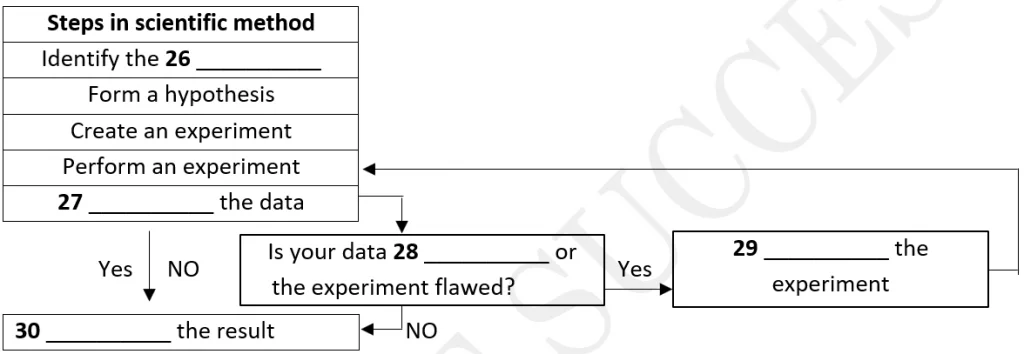
PART 4: Questions 31-40
Questions 31-33: Answer the questions below. Write NO MORE THAN THREE WORDS for each answer.
31. In which part of London is the Tate Modern? ____________
32. What did the building the Tate Modem is in use to be? __________
33. Work by whom is displayed on level 2 of the Tate Modern? __________
Questions 34-40: Complete the notes below. Write NO MORE THAN THREE WORDS AND/OR A NUMBER for each answer.
• Tate St. Ives
Location: Cornwall
Built on site of: 34 __________
Housed in: 35 _________
Opening date: 1993
Exhibits: 36 _________, including St Ives School
• Tate Britain
Location: Westminster
Opening date: 37 __________
Built on site of: old prison
Founder: Sir Henry Tate
Exhibits: 38 _________ and modern art
• Tate Liverpool
Opening date: 1988
Exhibits: displays from Tate Collection and 39 ________
Housed in: 40 __________
1. A 2. A 3. C 4. B 5. A 6. barbecue 7. 7/seven 8. discuss their day 9. (some)/(the) caves 10. buses 11. director/Director 12. reception staff 13. 35/thirty-five 14. 10 and 3/ten and three 15. get involved 16. emotional or physical 17. homesickness 18. daily 19. (about) 45 minutes/forty-five minutes 20. (the) Counselling Service 21. B 22. C 23. diagnosis 24. pure rational thought 25. (the) 11th century 26. problem 27. analyse 28. unreliable/unusual/surprising 29. modify 30. communicate 31. (the) South Bank 32. (a) power station 33. contemporary artists 34. (a) gasworks 35. (a) 3/three-storey buildings 36. modern British artists 37. 1897 38. historic 39. temporary exhibitions 40. (a) warehouse
Leave a Comment Cancel Reply
You must be logged in to post a comment.
- Intermediate
- Academic Listening
Life Stories
- Language Games
- English Idioms
- Basic English Quizzes
- English Culture Videos
- Vocabulary Lessons
- ESL Vocabulary Quizzes
- Live Broadcasts
- Who's Randall?
- Terms of Use
- Speaking Events
- License ESL-Lab Content
- First-Time Users
- Audio/Video Help
- Self-Study Guide
- ESL Study Handouts
- Randall's ESL Blog
- Randall’s Favorites
- Tips for Teachers
- Recommended Products
- Contact Randall
- DailyESL.com
- Trainyouraccent.com
- EZslang.com
“A Bear-Y Scary Camping Trip”
This lesson is designed to build your critical-thinking skills in English as you read, listen, and answer different types of comprehension and discussion questions.
Pre-Listening Activities
Ask these questions before you listen:
- Have you ever been camping? If so, where did you go, and what did you do?
- What would you need to pack for a camping trip in the mountains?
- Have you ever seen a moose or a bear in the wild? If so, what was your experience like?
- What would you do if you encountered a bear or a moose while hiking or camping?
- Have you ever jumped into a body of water from a high place before? If so, where and what was it like?
Here are other possible pre-listening activities:
- Vocabulary Brainstorming : Have students brainstorm and write down as many words as they can related to camping, mountains, wildlife, and adventure. Encourage them to think about nouns, verbs, and adjectives.
- Anticipation Guide : Provide students with statements related to camping, such as “Camping in the mountains can be dangerous” or “Encountering wildlife can be exciting.” Before listening to the story, ask them to indicate whether they agree or disagree with each statement. Afterward, revisit the statements and discuss any changes in their opinions.
- Discussion Starters : Write several open-ended questions about camping and outdoor adventures on the board. For example, “What is your most memorable camping experience?” or “What challenges do you think people face when camping in the mountains?” Engage students in a brief discussion to activate their prior knowledge and generate interest in the topic.
- KWL Chart : Provide students with a KWL (Know-Want to Know-Learned) chart related to camping in the mountains. In the “Know” column, have them write down what they already know about camping. In the “Want to Know” column, ask them to write questions they have or things they are curious about. After listening to the story, they can complete the “Learned” column with new information they acquired.

Listen and read the story and answer the questions. Key vocabulary words are marked in bold .
One summer, four friends named Josh, Jerry, Lisa, and Kelly decided to go camping in the Utah mountains.
They packed their gear, including tents, sleeping bags, and plenty of food, and set off on their adventure.
After hiking for a few hours, they came across a beautiful waterfall and decided to set up camp nearby. As they were roasting marshmallows over the campfire that night, they heard rustling in the bushes.
“Hey. Did you hear that? Lisa exclaimed with fear in her voice.
Suddenly, a giant moose appeared out of nowhere, and the friends quickly scrambled to their tents to play it safe .
But things only got worse.
The next morning, while they were exploring the nearby woods, they stumbled upon a black bear that began chasing them.
The friends ran as fast as they could, but the bear was gaining on them.
In a panic, they came across a steep cliff and had nowhere to go, but then, Lisa had an idea. A really terrible idea! She remembered the waterfall they had seen earlier and suggested the wacky idea of jumping off the cliff and into the pool below.
Josh, Jerry, and Kelly thought she was nuts , but they didn’t have any other options.
“Let’s do it!” yelled Josh, so they all jumped, screaming at the top of their lungs. To their surprise, the water was deep enough to break their fall, and they were able to swim to safety.
After catching their breath , the friends realized that they had lost the bear and the moose. They were all relieved and decided to make the best of it and continue their camping trip.
They explored more of the beautiful mountain scenery and even saw some bighorn sheep grazing in the distance! At the end of their trip, they all agreed that it was a wild adventure, and they were glad they didn’t let the ear and moose spoil their fun.
So, would you have done anything differently if you had been with them on that trip? Think about it.
Comprehension Questions: Self-Grading Quiz
Camping tri – life story, what did the friends do when they heard rustling in the bushes at night, why did lisa suggest jumping off the cliff into the pool below, what did the friends see in the distance during their camping trip, why did the friends continue their camping trip after the bear and moose encounter, what can you infer about the friends from their decision to jump off the cliff, comprehension questions in text format.
1. What did the friends do when they heard rustling in the bushes at night? A) They approached the bushes to see what was causing the noise. B) They quickly jumped into their tents. C) They hid behind a rock. D) They decided to explore the nearby woods.
2. Why did Lisa suggest jumping off the cliff into the pool below? A) She thought it would be a fun way to cool off. B) She wanted to impress her friends. C) She remembered seeing a waterfall nearby. D) She was afraid of the bear and moose.
3. What did the friends see in the distance during their camping trip? A) A giant moose B) A grizzly bear C) Bighorn sheep D) A beautiful waterfall
4. Why did the friends continue their camping trip after the bear and moose encounter? A) They wanted to continue exploring the mountain scenery. B) They thought it would be fun to encounter more animals. C) They had no other choice but to keep going. D) They wanted to confront the bear and moose.
5. What can you infer about the friends from their decision to jump off the cliff? A) They were experienced cliff jumpers. B) They were willing to take risks to escape danger. C) They were not very intelligent. D) They were not scared of the bear and moose.
1. Answer: B) They jumped into their tent.
Explanation: The story states that the friends “quickly scrambled to their tents to play it safe” when they heard rustling in the bushes at night, suggesting that they were trying to get away from whatever was causing the noise.
2. Answer: D) She was afraid of the bear and moose.
Explanation: Although Lisa may have also remembered seeing the waterfall, the story suggests that the friends were in a panic and had no other options, so Lisa suggested jumping off the cliff as a way to escape the bear and moose.3. Answer: C) Bighorn sheep
Explanation: The story states that the friends “explored more of the beautiful mountain scenery and even saw some bighorn sheep grazing in the distance,” indicating that they saw the sheep during their trip.
4. Answer: A) They wanted to continue exploring the mountain scenery.
Explanation: The story states that the friends decided to make the best of it and continue their camping trip after losing the bear and moose, suggesting that they were still interested in exploring the beautiful scenery.
5. Answer: B) They were willing to take risks to escape danger.
Explanation: The story suggests that the friends were in a panic and had no other options when they came across the cliff, but they still decided to jump off to escape the bear and moose, indicating that they were willing to take risks to protect themselves.
Discussion Questions
Easy (Recall and Comprehend) :
- What is the story about?
- Where did the friends go camping?
- What did the friends hear while they were roasting marshmallows?
Intermediate (Analyze and Interpret) :
- How did the friends react when they saw the moose?
- What happened when the friends stumbled upon the grizzly bear?
- What did Lisa suggest they do when they were trapped by the bear?
Advanced (Analyze and Interpret) :
- How can we balance our desire to explore the wilderness and experience nature with the need to protect and respect the habitats of wild animals?
- The characters in this story faced dangerous situations but ultimately found humor in their experience. How can humor and positivity help us cope with difficult situations?
- In what ways can the lessons learned from this camping trip be applied to other areas of life, such as in the workplace or personal relationships?
- How does our exposure to nature and the outdoors affect our mental and emotional well-being?
- What role do cultural attitudes and values play in shaping our relationship with nature, and how can we promote more sustainable and respectful attitudes towards the environment?
Class Activities
Because people learn and process language differently, a number of different activities have been prepared to accommodate a variety of learning styles (or modalities).
Verbal (Auditory) : Imagine you are one of the friends who encountered the bear. How do you describe your feelings and actions to a friend who wasn’t there?
Verbal (Auditory) : You are the bear. How do you describe the encounter with the four friends to another animal in the forest?
Hands-on (Kinesthetic) and Verbal (Auditory) : You are a park ranger who finds the friends after their encounter with the bear. How do you ensure their safety and provide them with assistance?
Hands-on (Kinesthetic) and Verbal (Auditory) : You are a survival expert who has heard about the friends’ encounter with the bear. What advice do you give them to prevent such situations in the future?
Verbal (Auditory) : You are a journalist interviewing the four friends after their camping trip. What questions do you ask to get their perspectives on the adventure?
Verbal (Auditory) : You are one of the friends who jumps off the cliff into the pool below. How do you describe the experience and the decision to jump to someone who wasn’t there?
Hands-on (Kinesthetic) and Verbal (Auditory) : You are a therapist who specializes in adventure-based counseling. How would you work with the four friends to process their experience and build resilience for future outdoor adventures?
More ideas:
Survival Strategies : Have students work in small groups and imagine they are in the same situation as the four friends in the story. Each group must come up with a list of survival strategies that they would use in case they encounter a wild animal while camping.
Map Making : Provide students with a blank map of the area where the story takes place. Have them draw and label important landmarks, such as the waterfall, the cliff, and the campsite. Encourage them to use descriptive language to explain the significance of each location.
Animal Research : Assign each student an animal that is commonly found in the Utah mountains, such as moose, mountain lions, big hornsheep, or black bear. Have them research the animal and present their findings to the class, including facts about its behavior, habitat, and diet.
Alternate Endings : Have students work in pairs or small groups and come up with alternate endings to the story. Encourage them to think creatively and to consider how the characters’ decisions might have affected the outcome.
Survival Skits : Have students create skits that depict different scenarios in which the characters in the story must use their survival skills to overcome obstacles, such as escaping from a dangerous animal or finding food and water.
Mountain Safety Tips : Have students research and compile a list of safety tips for camping in the mountains. Encourage them to think about potential dangers and how to avoid them.
Wildlife Encounter Debate : Divide the class into two groups and have them debate the best course of action when encountering a wild animal while camping. Encourage students to support their arguments with facts and examples.
Naturalist Observations : Have students spend time in nature and observe the wildlife and scenery around them. Encourage them to take notes and sketch what they see, and then discuss their observations as a class.
Real-Life Survival Stories : Have students research and present real-life stories of people who have survived dangerous encounters with wild animals or other natural disasters. Encourage them to consider the skills and strategies used by the survivors.
Nature Writing : Have students write descriptive essays or poems about the natural scenery and wildlife depicted in the story. Encourage them to use sensory language and to reflect on their personal experiences with nature.
Language Game
One classroom language game based on this story is “Word Chain.”
- Divide the class into two teams.
- Choose a starting word related to the story, such as “camping.”
- Team 1 must come up with a word related to camping that starts with the last letter of “camping,” such as “gear.”
- Team 2 must come up with a word related to “gear” that starts with the last letter of “gear,” such as “rope.”
- The game continues until one team cannot think of a word within a set time limit, or a team repeats a word that has already been used.
- The team with the most words at the end of the game wins.
This game can help students practice vocabulary related to camping and the story while also encouraging quick thinking and collaboration within a team.
Different AI technologies, including ChatGPT and an AI voice generator, were used in a collaborative way to prepare the content for this lesson.
- Easy Listening
- Intermediate Listening
- Difficult Listening
- Academic English Listening

OCI CLASSES
Oxford Computer Institute
Ielts listening practice test 64 with answer

Questions 1-5
Choose the correct letter A , B or C.
(1) The camping trip will be held
A the following month.
B from the 24th to the 26th.
C over a five-day period.
(2) Jamie’s complaint about last year’s trip that
A the camp wasn’t big enough.
B he was unhappy while at the camp.
C he had problems finding the camp.
(3) The campsite is located
A in the Lake District.
B in Carlisle.
C beside Lake Brant.
(4) Jamie thinks the forests will be good for children who
A are used to nature.
B live in cities.
C like sports.
(5) Each child will pay
A less than £4 a night.
B approximately £5.
C more than £10.
Questions 6-10
Complete the sentence below.
Write ONE WORD ONLY for each answer.
(6) After they arrive, the children will have a ………… at 8 o’clock.
(7) On Saturday morning the children will get up at ………… .
(8) During the ‘talk back’ session the children can ………… their day.
(9) On Sunday the children will go on a day trip to visit the ………… .
(10) At 6 o’clock on Sunday the children will be on the ………… .
Questions 11-16
Choose the correct answer A , B or C.
(11) According to the speaker, in what way is Camber’s different from other theme parks ?
A It’s suitable for different age groups.
B It offers lots to do in wet weather.
C It has a focus on education.
(12) The Park first opened in
A 1980.
B 1997.
C 2004.
(13) What’s included in the entrance fee ?
A most rides and parking.
B all rides and some exhibits.
C parking and all rides.
(14) Becoming a member of the Adventurers Club means
A you can avoiding queuing so much.
B can enter the Park free for a year.
C you can visit certain zones closed to other people.
(15) The Future Farm zone encourages visitors to
A buy animals as pets.
B learn about the care of animals.
C get close to the animals.
(16) When is hot food available in the park ?
A 10.00 a.m. – 5.30 p.m.
B 11.00 a.m. – 5.00 p.m.
C 10.30 a.m. – 5.00 p.m.
Questions 17-20
What special conditions apply to the following rides ?
Choose FOUR answers from the box.
Write the correct letter A-F next to the questions 17-20.
Special conditions for visitors
A Must be over a certain age
B Must use special safety equipment
C Must avoid it if they have health problems
D Must wear a particular type of clothing
E Must be over a certain height
F Must be accompanied by an adult if under 16
Questions 21-25
Circle the correct letter.
(21) According to Judith Davidson, may people fail in the job – hunting because they
A Can’t complete their interviews.
B Are inadequate at interviews.
C Are not capable of accomplishing application forms.
(22) What does Judith concentrate on helping management trainees to do
A How to graduate form universities.
B How to seek job after graduation.
C How to pass examinations successfully.
(23) According to Judith, the chance of getting a job are small if
A The applications are not university graduates.
B The applicants are not skillful when talking the interviews.
C The applicants are not qualified and brilliant enough.
(24) What are the other factors that prevent applications from succeeding
A Their application form are not tidy and normal enough to leave a good impression.
B The application form arrive late.
C They are often dirty or untidily dressed.
(25) Which one of the following about Mark is TRUE
A He stands out from others and leave good impact with the employer.
B He changes for writing job applications for others.
C He is a full – time writer of job.
Questions 26-30
Complete the information below.
Write NO MORE THAN THREE WORDS OR A NUMBER for each answer.
(26) How many curriculum vitae has Mark written in the past few months ?
………………..
(27) What does Mark think many people can’t deal with in their forms ?
(28) In the initial interview, what does Mark to make his clients consider ?
(29) What decides the type of C.V. Mark aims to write the ?
(30) What does Christopher think the applications should send along with the forms an ?
Questions 31-40
Complete the summary below.
What is amber ?
It is a kind of (31)………… resin, trapping debris like seeds and insects.
The majority of amber was formed about 30-90 (32)………… years ago.
Why is resin produced ?
A protection mechanism
- To protect tress from (33)………… and injury
- To heal a wound
- To (34)………… excess acetate
What type of depositional environment preserved amber ?
Trees and resin were (35)………… and deposited in quiet water sediments.
What are the uses of amber ?
Used as medicine for chronica and precious (36)………… .
How to preserve amber jewelry ?
(37)………… may attack the softness and brittleness of amber.
When stringing amber beads, do leave (38)………… between each bead.
Remove dust and sweat with (39)………… and (40)………… water and soft cloth.
ANSWERS (ielts listening practice test 64)
- Grammar and Spelling
- Their Motivation
- Kind of Job
- Accompanying Letter
- Transported
If you enjoyed “ielts listening practice test 64”, please share this post and comment on it.
Er. Nachhattar Singh ( CEO, blogger, youtuber, Motivational speaker)
Leave a Reply Cancel reply
Your email address will not be published. Required fields are marked *
Save my name, email, and website in this browser for the next time I comment.
Main navigation
Learning english, a camping adventure, how difficult was this activity.
Read about a camping trip and answer some questions
Try these activities next

Giving advice to a friend

The teacher
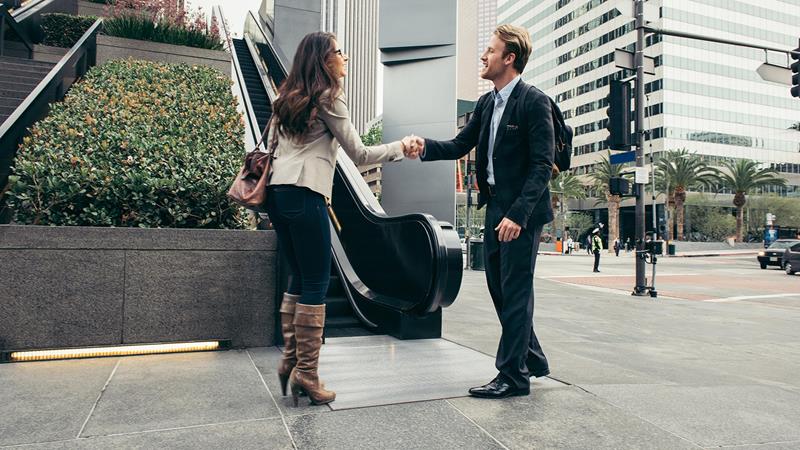
Meeting people for the first time
- Music for Studying
- Guest Post || Sponsored Post
- Privacy Policy

Easy English listening Lesson 4 – Going Camping

Exercise for this lesson:
- Where did the Bright family go camping?
- How long did the Bright family camp?
- What did the Bright family bring with them for camping?
- What activities did they do on Friday evening?
- What did the Bright family do on Saturday?
- What activities did they engage in on Sunday?
- Name two birds that the Bright family saw.
- Did they encounter a bear during their camping trip?
- What did the Bright family do around the campfire?
- How would you describe the Bright family’s vacation?
Please comment your answers!
➡ Lesson 5 – My House
➡ English Listening for Beginners
You may also like

100 English Listening Lessons for Intermediate Level

Intermediate Listening Lesson 99 – North...

Intermediate Listening Lesson 100 – The Vikings

Intermediate Listening Lesson 98 – Nike
Part 2 For each question, write the correct answer in the gap. Write one word or a number or a date or a time . You will hear a teacher telling students about a school camping trip.
School Camping Trip
Cost of trip: £39.00
Give money to: Mrs 6
Day of return: 7
Time to arrive at school: 8 a.m.
Travel by: 9

Practice Cambridge IELTS 7 Listening Test 1 with Answers
cambridge ielts 7 listening test 1, cambridge ielts 7 listening test 1 – section 1.
Section 1: Questions 1-5 Complete the notes below. Write NO MORE THAN THREE WORDS.
Transport from Airport to Milton
Distance : 147 miles Options : • Car hire – don’t want to drive • (1) ___________ – expensive • Greyhound Bus
$15 single, $27.50 return Direct to the (2) ___________ Long (3) ___________
• Airport Shuttle
(4) ___________ service Every 2 hours $35 single, $65 return Need to (5) ___________

Questions 6-10 Complete the booking form below. Write ONE WORD OR A NUMBER.
Airport Shuttle Booking Form
To: Milton Date: 6 _________ No. of passengers: One Bus Time: 7 _________ pm Type of ticket: Single Name: Janet 8 _________ Flight No: 9 _________ From: London Heathrow Address in Milton: Vacation Motel, 24 Kitchener Street Fare: $35 Credit Card No: (Visa) 10 _________
Cambridge IELTS 7 Listening Test 1 – Section 2
Section 2: Questions 11-16 Choose the correct letter A, B or C.
11. PS Camping has been organising holidays for
A 15 years B 20 years C 25 years
12. The company has most camping sites in
A France B Italy C Switzerland
13. Which organised activity can children do every day of the week?
A football B drama C model making
14. Some areas of the sites have a ‘no noise’ rule after
A 9.30 p.m B 10.00 p.m C 10.30 p.m
15. The holiday insurance that is offered by PS Camping
A can be charged on an annual basis B is included in the price of the holiday C must be taken out at the time of booking
16. Customers who recommend PS Camping to friends will receive
A a free gift B an upgrade to a luxury tent C a discount
Questions 17-20 What does the speaker say about the following items?
Write the correct letter A, B or C next to questions 17-20
17 . barbeques 18 . toys 19 . cool boxes 20 . mops and buckets
A They are provided in all tents. B They are found in central areas of the campsite. C They are available on requests.
Cambridge IELTS 7 Listening Test 1 – Section 3
Section 3: Questions 21-23 Complete the notes below. Write ONE WORD ONLY.
Differences Between Individuals In The Workplace
Individuals bring different: • Ideas • (21) ___________ • Learning experiences
Work behavior differences are due to: • Personality • (22) ___________
Effects of diversity on companies: • Advantage: diversity develops (23) ___________ • Disadvantages: diversity can cause conflict
Questions 24-27 Choose the correct letter, A, B or C.
24. Janice thinks that employers should encourage workers who are
A potential leaders B open to new ideas C good at teamwork
25. Janice suggests that managers may find it difficult to
A form successful groups B balance conflicting needs C deal with uncooperative workers
26. Janice believes employers should look for job applicants who
A can think independently B will obey the system C can solve problems
27. Janice believes managers should
A demonstrate good behavior B encourage co-operation early on C increase financial incentives
Questions 28-30 Complete the sentences below. Write ONE WORD ONLY.
28 . All managers need to understand their employees and recognise their company’s ___________
29 . When managing change, increasing the company’s ___________ may be more important than employee satisfaction.
30. During periods of change, managers may have to cope with increased amounts of ___________
Cambridge IELTS 7 Listening Test 1 – Section 4
Section 4: Questions 31-35 Complete the notes below. Write ONE WORD ONLY.
Seminar On Rock Art
Preparation for fieldwork trip to Namibia in (31) ___________
Rock art in Namibia maybe
• Paintings • Engravings
Earliest explanation of engravings of animal footprints
They were used to help (32) ___________ learn about tracking.
• Why are the tracks usually (33) ___________ ? • Why are some engravings realistic and other realistic? • Why are the unrealistic animals sometimes half (34) ___________ ?
More recent explanation
Wise men may have been trying to control wild animals with (35) ___________
Questions 36-40 Complete the sentences below. Write ONE WORD ONLY.
36 . If you look at a site from a ___________ , you reduce visitor pressure.
37 . To camp on a site may be disrespectful to people from that ___________
38 . Undiscovered material may be damaged by ___________
39 . You should avoid ___________ or tracing rock art as it is so fragile.
40 . In general, your aim is to leave the site ___________
Cambridge IELTS 7 Listening Test 1 Answers
Practice with Expert IELTS Tutors Online
Apply Code "IELTSXPRESS20" To Get 20% off on IELTS Mock Test
1. taxi 2. city centre 3. wait 4. door to door 5. reserve (a seat) 6. 17 of October 7. 12.30 8. Thomson 9. AC936 10. 303 8450 2045 6837 11. B 12. A 13. B 14. C 15. C 16. A 17. C 18. A 19. C 20. B
21. attitudes 22. gender 23. creativity 24. A 25. B 26. A 27. B 28. culture 29. profits 30. stress 31. april 32. children 33. repeated 34. human 35. magic 36. distance 37. culture 38. fires 39. touching 40. intact
Practice: Practice Cambridge IELTS 9 Listening Test 1 with Answers
Oh hi there! It’s nice to meet you.
Sign up to receive awesome content in your inbox, every week.
We promise not to spam you or share your Data. 🙂
Check your inbox or spam folder to confirm your subscription.

Oh Hi there! It’s nice to meet you.
We promise not to Spam or Share your Data. 🙂
Related Posts

Cambridge IELTS 18 Academic Reading Test 4

Cambridge IELTS 18 Academic Reading Test 3

Cambridge IELTS 18 Academic Reading Test 2
2 thoughts on “practice cambridge ielts 7 listening test 1 with answers”.
Leave a Comment Cancel Reply
Your email address will not be published. Required fields are marked *
Yes, add me to your mailing list
Start typing and press enter to search
Welcome Guest!
- IELTS Listening
- IELTS Reading
- IELTS Writing
- IELTS Writing Task 1
- IELTS Writing Task 2
- IELTS Speaking
- IELTS Speaking Part 1
- IELTS Speaking Part 2
- IELTS Speaking Part 3
- IELTS Practice Tests
- IELTS Listening Practice Tests
- IELTS Reading Practice Tests
- IELTS Writing Practice Tests
- IELTS Speaking Practice Tests
- All Courses
- IELTS Online Classes
- OET Online Classes
- PTE Online Classes
- CELPIP Online Classes
- Free Live Classes
- Australia PR
- Germany Job Seeker Visa
- Austria Job Seeker Visa
- Sweden Job Seeker Visa
- Study Abroad
- Student Testimonials
- Our Trainers
- IELTS Webinar
- Immigration Webinar
Fairview Lake Camping Centre Listening Answers
Updated On Sep 18, 2023

Share on Whatsapp
Share on Email
Share on Linkedin

Free IELTS Listening Practice Test with Audios & Answers
This article contains the Fairview Lake Camping Centre listening answers.
Fairview Lake Camping Centre is a real IELTS Listening task.
In the IELTS Listening Test, you will encounter a series of questions based on a short audio recording on a particular topic. To attempt the Listening test, you have to practice discerning the important information being relayed in the audio format and using it to answer the test questions.
Here is the Listening practice test on the topic – Fairview Lake Camping Centre.
Take the test now and check the Fairview Lake Camping Centre listening answers below!
Not sure how to answer IELTS Listening Map Labelling questions? Check the video below to learn now!

In the IELTS Listening Test, you will encounter a series of questions based on a short audio recording on a particular topic. To attempt the Listening test, you have to practice discerning the important information being relayed in the audio format and using it to answer the test questions. By practicing with sample questions, you can ensure a good score on this Module of the IELTS.
Here is a sample Listening test to get you started.
In the IELTS listening practice test , there are 40 questions of different types ranging from sentence completion, map labelling to multiple choice questions. It is important to attempt a test such as this to increase your exam preparedness.
In Listening Test 44, you will hear 4 audio recordings and answer questions 1-40.
Section 1 is a conversation between a receptionist of camping centre and a customer who wants to make a booking.
Section 2 is a staff member briefing a group of mothers on the attractions at the Children’s Grand Forest play centre.
Section 3 is a dialogue between a PE teacher and an administrator at a summer school.
Section 4 is a monologue given to parents on planning further education of their students.
Audio Transcription
Download Audio Transcription
Questions 1-10
Complete the notes below..
Write NO MORE THAN TWO WORDS AND/OR A NUMBER for each answer.
Fairview Lake Camping Centre
The three functions of the centre are:
conference centre
Example: educational institution
place for full-filled weekends
The customer wants to bring children who have 1 _______________________
SPORTS: Sailing, windsurfing, volleyball, rowing, and a sport most children have never tried which is 2 ________
Accommodation Facilities
The Birch Unit – sleeps 3 ___________________
Greenback Row – sleeps the same number of people.
Cabins 1-3: sleep 10 people
Cabins 4 ______________ : sleep 12 people each
Mr Bryson’s booking arrangements
The customer would bring 5 ______________ students for the course.
He would like to book the course starting Sunday 6 _________________
The cost for one week would be 7 ___________________ per child.
The school’s telephone number is 8 ______________________
Q. 9 and 10
9 The receptionist suggests Mr Bryson’s group eat with the other groups because
A it works out cheaper that way.
B it’s more sociable.
C you can do your own cooking.
10 Before he decides whether to accept the course or not, Mike Bryson will
A check with a higher authority.
B ask for lower prices.
C see what the children have to say.
Questions 11-20
Label the map below.
Write the correct letter, A-G.

Label the diagram below.
Write NO MORE THAN TWO WORDS for each answer.

Questions 21-30
A preparation courses for graduate studies
B teacher training
C future employment
D graduate studies
E management training course
23 Paddy is interested in the sports programme because
A he needs a qualification to teach PE.
B he wants to improve his general teaching skills.
C he has been told to attend it.
24 The swimming course concentrates on
A competitive swimming.
B teaching beginners.
C technical aspects of swimming.
25 Paddy is interested in the equestrian course because
A he thinks it will help him get better employment.
B there is great interest in this sport in his present school.
C he has always been interested in riding.
26 The beginners on the equestrian course will be taught
A basic horsemanship.
B only dressage and show jumping.
C only flatwork and show jumping.
27 When is the deadline for enrollment?
A mid-April
B late April
C early May
Complete the summary below.
Paddy is also interested in a course on 28 _______________, but he knows nothing about it. Conveniently, it is a 29 ____________ so it doesn’t matter that he is back at school. Apart from that, he is advised to take a 30 ______________, which will teach him body awareness, and an appreciation of music.
Also check :
- IELTS Listening Answer Sheet
- IELTS listening recent actual test
- IELTS Listening preparation tips
- IELTS Listening words
- How to Improve IELTS Listening Section 3 and 4?
- What is Signposting?
Questions 31-40
Sending your child to University
Someone with a higher education earns 31 _______________ more than someone without.
In 1997 maintenance grants abolished and 32 _____________ introduced.
University fees increasing – up to 33 _____________________ a year.
Average undergraduate needs 34 __________________ for 3 years.
Almost 80% of students’ cost are 35 _______________________.
PAYING FOR YOUR CHILD’S EDUCATION
Students’ tuition can be paid for, in part, if they join the 36 ___________________.
The RAF will sponsor, but students must take up at least 37 _______________ service commitment.
Students good at sport might secure a 38 _____________________.
The University of Kent gives a 39 _______________ cricket bursary to promising players.
Student Loans:
Maximum 40 _________________ is 5,000 pounds.
Needn’t be paid back until after graduation.
Unlock Answer
Signup/Login and get access to the answers
Practice Test 43 << >> Practice Test 45
Practice IELTS Listening based on question types

Guide for Predicting Answers on the IELTS Listening Test
Nafia Zuhana is an experienced content writer and IELTS Trainer. Currently, she is guiding students who are appearing for IELTS General and Academic exams through ieltsmaterial.com. With an 8.5 score herself, she trains and provides test takers with strategies, tips, and nuances on how to crack the IELTS Exam. She holds a degree in Master of Arts – Creative Writing, Oxford Brookes University, UK. She has worked with The Hindu for over a year as an English language trainer.
Explore other Listening Practice Tests
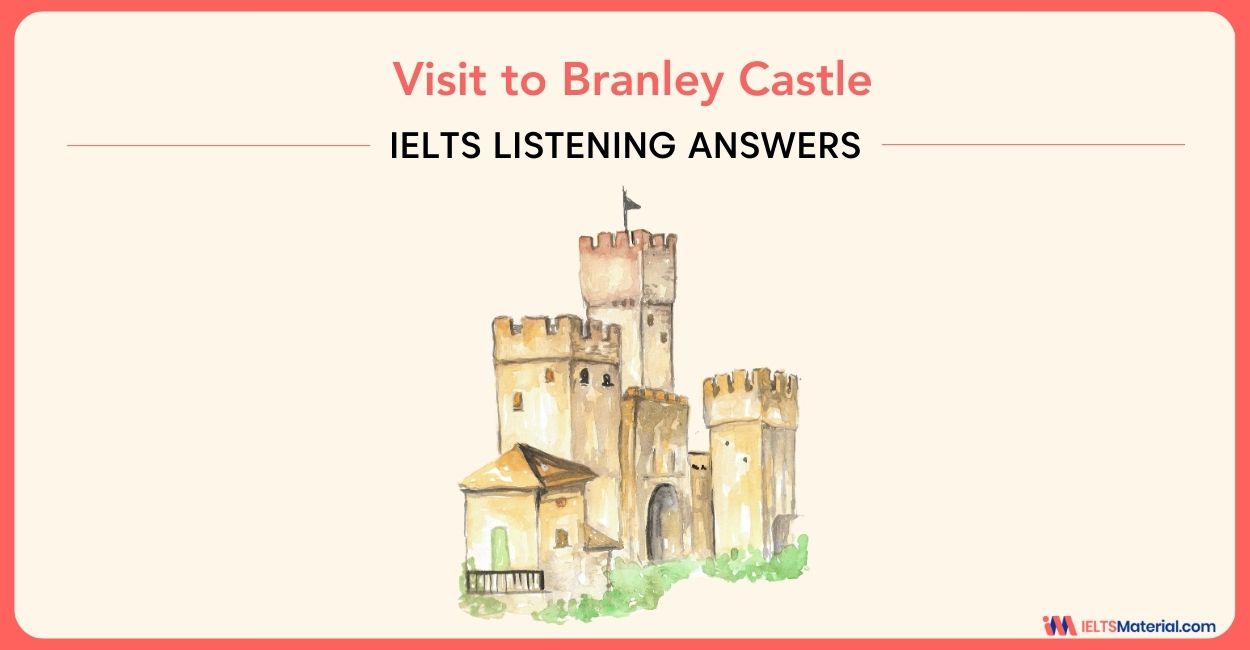
Kasturika Samanta
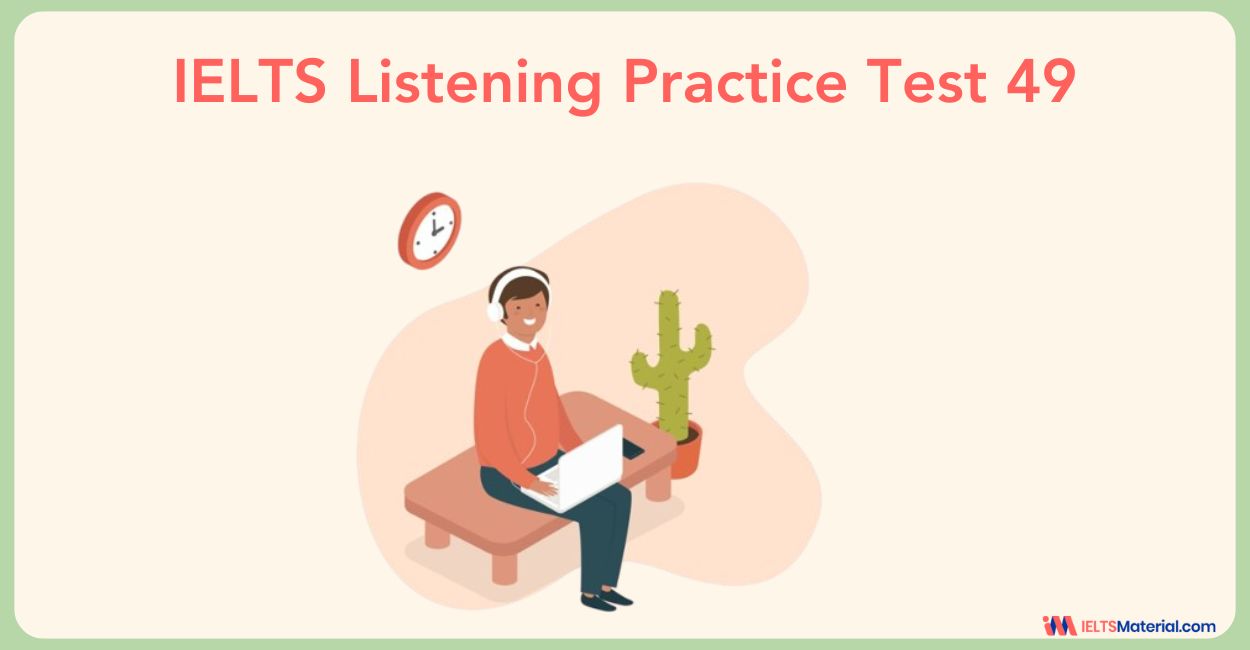
Courtney Miller
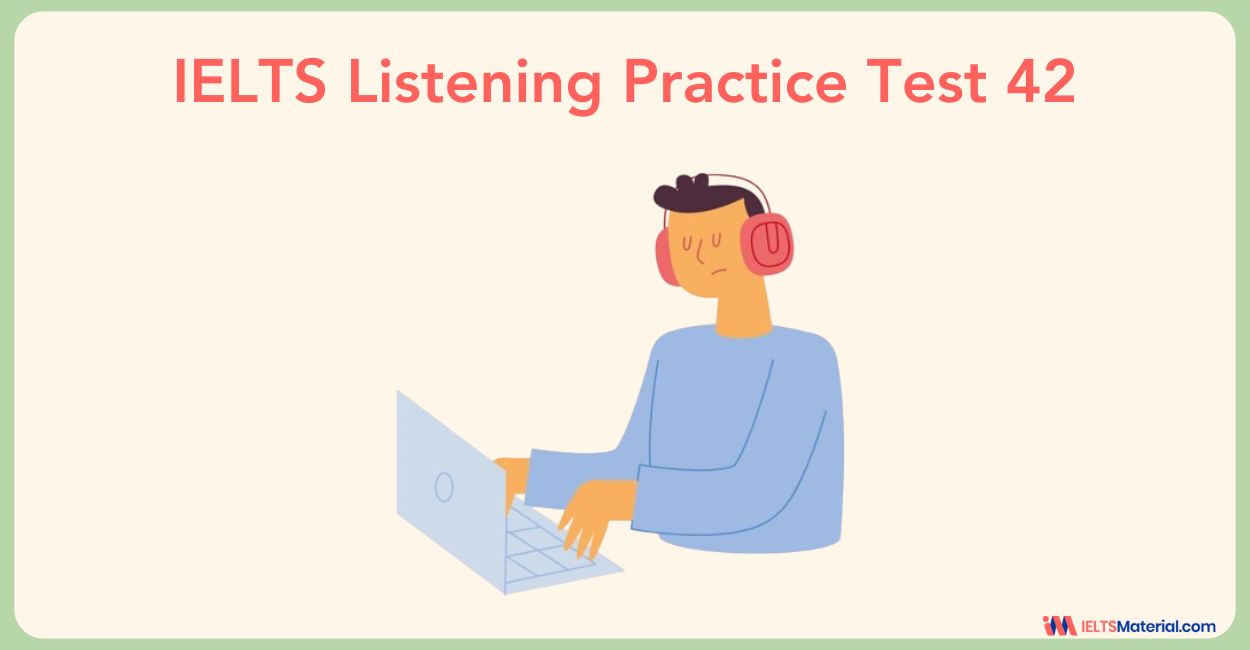
Post your Comments
Posted on Mar 5, 2020
Hi Mr Huy, how can I subscribe to email updates from the blog? I subscribed last year, and I get emails every day, and my friends want to also subscribe, but I can’t find a link anywhere. I can’t remember how I subscribed. Can you please give me a link for my friends?
Posted on Jul 29, 2020
We will we soon adding the subscribe button in our website it will be available by this week. Since we are working on the enhancing the website.
le thi mai trang
Posted on Sep 20, 2016
Dear Mr. Huy. I can find the audio for this listening 44 test. Can you tell me where to download it, please. Thank you very much!
Oh, I’m sorry for my mistake. I’ve just updated the audio for this test. Thank you for reminding me 🙂 Hope you have great studying day 🙂
Recent Articles
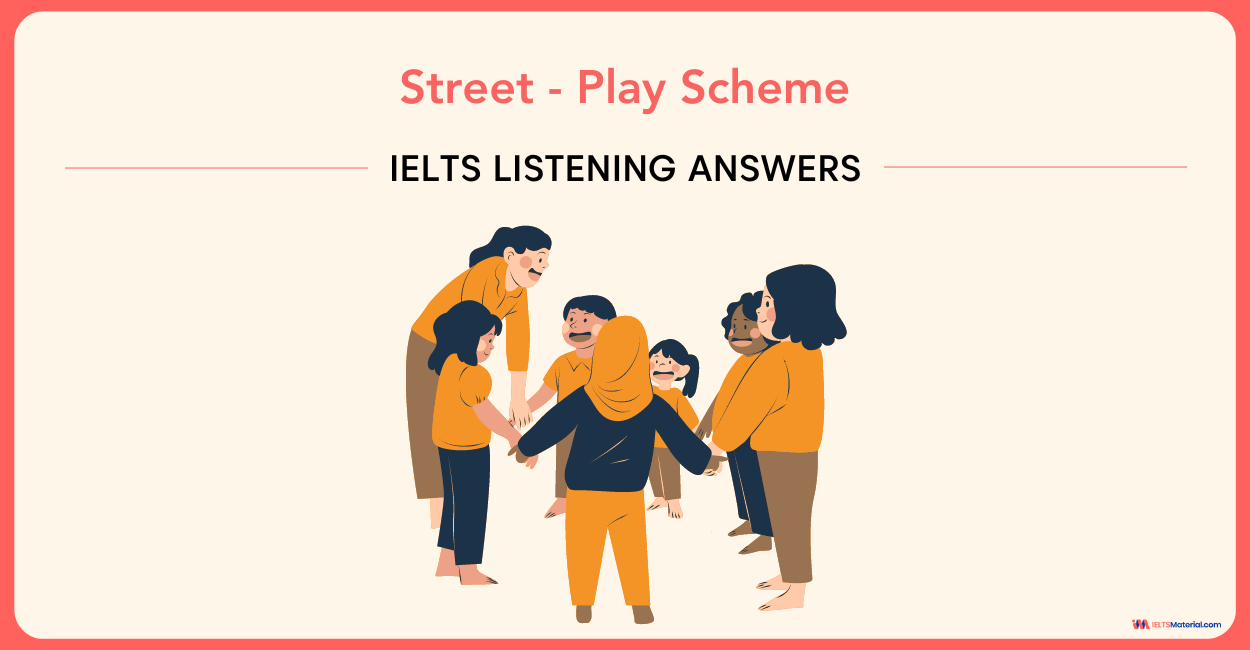
Raajdeep Saha

Nehasri Ravishenbagam
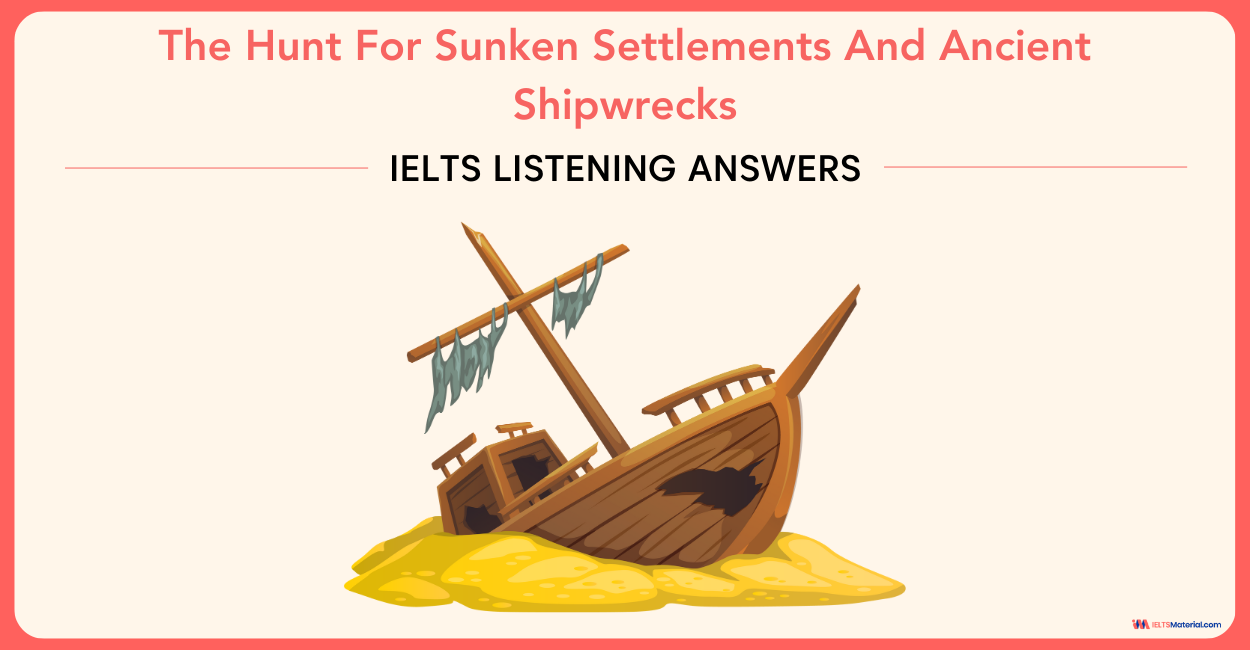
Our Offices
Gurgaon city scape, gurgaon bptp.
Step 1 of 3
Great going .
Get a free session from trainer
Have you taken test before?
Please select any option
Get free eBook to excel in test
Please enter Email ID
Get support from an Band 9 trainer
Please enter phone number
Already Registered?
Select a date
Please select a date
Select a time (IST Time Zone)
Please select a time
Mark Your Calendar: Free Session with Expert on
Which exam are you preparing?
Great Going!

IELTS Mock Test 2022 January
- Published on: 24 Jan 2022
- Tests taken: 875,646
Answer Keys:
Part 1: Question 1 - 8
- 1 (the) Water Treatment Plant
- 2 8 o’clock/ 8 am
- 3 2.5 hours
- 4 visit (the) dam / see dam functioning
- 5 (a) youth hostel
- 6 breakfast (and) supper / evening meal
Part 2: Question 11 - 20
- 11 Consumer’s Choice
- 12 (the) month
- 13 (about) 360
- 14 (They) vanished
Part 3: Question 21 - 30
- 22 has / got an exemption /(has) practical experience
- 23 June 20(th); June 25(th) (in either order)
- 30 collect a sample / collect sample programmes
Part 4: Question 31 - 40
- 32 (the) first model
- 33 Core Wars
- 34 intellectual entertainment
- 37 be (very) careful
- 38 avoid trouble
- 39 understand (viruses)
- 40 be (well) prepared
Review your test now?
Leaderboard:
Share your score
Tips for improving your ielts score


IELTS Mock Test Reading
Reading is the second part of the IELTS test, and takes 60 minutes. It consists of three or sometimes four reading passages of increasing difficulty,...
22 Aug 2018
Scan below QR code to share with your friends
Review & Explanations:
Questions 1-7
Complete the following notes by using A NUMBER or NO MORE THAN THREE WORDS for each answer.
University Geography Field Trip
Questions 8-10
Choose THREE letters, A-F
Which THREE things does Cesar recommend bringing?
- A binoculars
- F mobile phone
Questions 11-15
Complete the sentences below.
Write NO MORE THAN THREE WORDS AND/OR A NUMBER for each answer.
The last programme in the present series is 11
Miss Patty Ching has been rewarded as ‘Consumer of the 12 ’ for her persistent effort to see through a result of a complaint.
She took 13 of photographs on her tour in Europe.
What happened to her photos after she gave them to Top-Class Photo Services for developing ? 14
The photo services compensated her 15 dollars for the loss in the end.
Questions 16-20
Choose the correct letter, A-D .
What is the problem that many listeners write about?
- A Sale prices.
- B Bad quality stuff.
- C Faulty goods.
- D Bad assistant.
How much was the sale price of the belt that Mr Alvin liked?
Why should the consumer make a complaint about bad articles or service?
- A To cause a fuss.
- B It won’t do what is claimed for.
- C Ask the shopkeeper for a favour.
- D The shopkeeper should be responsible for it.
What should a consumer do when complaining in person?
- A Get a receipt for what you buy.
- B Speak to someone in authority.
- C Talk directly to the assistant.
- D Ask to see the seller.
What should a customer do when complaining on the phone?
- A Speak directly to the owner.
- B Ask for the manager.
- C Write a complaining letter.
- D Find out with whom you discuss the matter.
Questions 21-22
Complete the notes below.
Write NO MORE THAN THREE WORDS OR A NUMBER for each answer.
Student Record Card
Question 23
Write TWO DATES for the answer,
The final date of the examination should be 23
Questions 24-25
Choose the correct letters, A-D.
Dr Richardson explains that the set exercises
- A require reference to a wide range of resources.
- B should be at least 250 words in length.
- C focus on key terms and concepts in media studies.
- D do not have answers.
Dr Richardson explains that essays 1 and 2
- A are to be the same length.
- B should both be analytical.
- C both emphasize studies of audiences.
- D should be especially easy for David.
Questions 26-28
Complete the table by writing ONLY ONE appropriate letter ( M, T, A or J ) as explained below.
How does Dr Richardson describe each of the assignments ?
- 26 Answer: M Listen from here Report
- 27 Answer: A Report
- 28 Answer: J Listen from here Report
Question 29
Choose the correct answer.
Which two time slots does Dr Richardson suggest David use for his essay?
- A The six o’clock and the midmorning.
- B The breakfast and the six o’clock.
- C The midmorning and midnight.
- D The midday and the ten o’clock.
Question 30
Answer the question below.
Write NO MORE THAN THREE WORDS for the answer.
What will David do before he decides which part of the programmes to use?
Question 31
Choose the correct letter, A – C.
What does John Upton compare a computer virus to?
- A A biological organism.
- B A corrupt programme.
- C An irritating person.
Questions 32-35
Complete the flow chart. Write NO MORE THAN THREE WORDS for each answer.
- 33 Answer: Core Wars Listen from here Locate Report
- 34 Answer: intellectual entertainment Locate Report
Question 36
Choose the correct letter, A-C.
What does the speaker find surprising?
- A The rise in the number of software infections.
- B The determination of those who develop viruses.
- C The fact that people blame their own computers.
Questions 37-40
List FOUR ways of combating viruses. Write NO MORE THAN THREE WORDS for each answer.
- 37 Answer: be (very) careful Listen from here Locate Report
- 38 Answer: avoid trouble Listen from here Locate Report
- 39 Answer: understand (viruses) Listen from here Locate Report
- 40 Answer: be (well) prepared Listen from here Locate Report
R = Rachel; C = Cesar R: Hi, Cesar. How are you? C: Good, thanks, Rachel. I’m fine. I was going to ring you tonight so it’s a good thing I’ve run into you. I wanted to remind you about the field trip – the two day field trip next week. R: What field trip? C: The geography field trip to the Warragamba Dam and the Water treatment Plant. It’s a compulsory part of the first year environmentalScience course. Didn’t you know about it? R: Nol I must have missed that piece of information; this is news to mel But give me the details, please! C: Sure! Well, we have to meet outside the Library next Monday at 7 in the morning or you can meet us at 7:45 at the bus station in time to catch the coach which departs at 8 o’clock . R: Oh, alright. And how long does it take to get to this place? C: Well, once we’re on the coach , it will take about two . Er…, no! Actually more like two and a half hours at that time of day. And it could take as long as three hours to come back the next day because of the evening traffic. R: And what’s the purpose of the trip? C: Didn’t you get the course outline? You don’t seem to know anything about this course! R: Well, remember, I only started at the university a month ago, so I joined the course two weeks late and I’ve been trying to catch up ever since! C: Oh, of course! Well, we spend the first day visiting the dam . I believe we actually go inside the wall of the dam, which is really quite interesting – to see the dam functioning, you know, how much they regulate the water supply each day, depending on how much water is needed downstream in Sydney. R: Oh. OK. And um, so, if this is a two-day trip, where are we staying? Not camping by the dam, I hope! C: No, no. Not camping. They do actually have some overnight cabins near the dam for visiting groups, but we’re spending the night in a youth hostel , in a town nearby. That’s all been arranged by the university. R: And what about meals? Should we take our own food along? C: No, you won’t need to do that. The hostelprovides two meals, breakfast and an evening meal and we can find a cheap place to buy lunch. R: Greatl So, is this the only dam that supplieswater for Sydney? C: There are a couple of others too, but this is the main one. R: Well, with a population of over four and a half million people, I suppose we douse thousands of litres each day. C: Absolutely! In fact, according to my notes here, they pump the water through something like 20,000 kilometres of pipes and canals and store the water in 262 service reservoirs . And each day we use enough water to fill 600 Olympic swimming pools. R: And what’s happening on the second day? C: Urn…well, we’re coming back to town and going to the Water Treatment Plant to see how they purify the water for drinking. R: Oh, that should actually be quite interesting. I’ll bring my camera . C: Yes, that’s a good idea because we’re supposed to include original photos for the final piece of work at the end of the course. And make sure you bring a notebook and pen or pencil. R: OK. I’ll do that. C: You’ll probably need some good walking shoes and spare clothes, too. And I would recommend that you bring a waterproof coat of some sort because the chances of it raining are pretty good next week. And a hat, perhaps? R: Sorry, no. I draw the line at a hat! C: Fair enough. And by the way, do you have a mobile phone ? R: I do actually. C: Well, bring that along because that way we can keep in touch more easily. R: Provided that mobiles work up there, of course! C: That’s a point! R: Do I need a map? C: No, I wouldn’t bother. We won’t need to do any map reading. R: OK, then. See you on Monday, and thanks very much for letting me know.
D = Denis; W – Wendy D: Hello, everyone. Welcome again to ‘ Consumer’s Choice ", which is the last in our present series. Isn’t that right, Wendy? W: Yes, that’s right. But we’ll be back again after summer break with a new series well . We’ll tell you more about that later. But, first, in today’s program, we start off with the missing photographs . We’ll tell you a story of Miss Patty Ching, one of our listeners will. We’ll tell you how she has qualified for our ‘Consumer of the Month ’ award with her determination. Denis? D: Thank you, Wendy. Well, Miss Patty Ching went on a holiday to Europe last month. This was her first ever trip abroad and one for which she’d been saving for ten years . Her tour took her around 12 countries in 21 days. And being a keen photographer, she took lots of photographs; 10 rolls of film, to be exact. About 360 photographs . When Patty got back home, she gave all her photos to Top-Class Photo Services for developing. And they vanished . She never saw them again. Of course, she was furious with the company and complained . They apologised and offered her compensation : 10 free rolls of film. This made her even more angry. And she rejected this completely inadequate offer and asked for two thousand dollars . The company refused her request. So Patty wrote them a letter, telling them to pay up in 10 days or she would take them to court. She received no reply. So she did take them to court. But two days before the case was due to be heard, she received a cheque for $2,000. Top- Class had obviously made their minds up on how the judge would decide. Patty’s case provides a lesson to all of us. If we want our rights as consumers , we’ve got to fight for them. So for her determination and spirit we name Patty our ‘Consumer of the Month.’ W: Thank you, Denis. And now I’d like to deal with the problem that many of our listeners write about – sale prices. When we go to a sale and see a sign on something saying 50% off or $300 reduced to 100, how do we know the prices really have been reduced? One of our listeners, Mr Alvin Lok tells his story: ‘In a department store where I sometimes shopped, I saw a leather belt priced at $100, too expensive to me. But I liked it and thought I might buy it next time the store had a sale. The store did have a sale. And I went back to look for the belt. It was there all right, but the ticket on it now read 200 dollars reduced to 150 . The sale price was actually higher than the normal / What can we, as consumers, do in a case like this? The answer to Alvin’s question is that at the moment all we can do is to complain to the store’s management and bring these cases to the attention of the public. Bad publicity might help to put a stop to this dishonest practice. Of course making a fuss about faulty goods or bad service is never easy. Most people dislike making a fuss. But if something you have bought is faulty or does not do what was claimed for it, you are not asking for a favour to get it right. It is the shopkeeper’s responsibility to take the complaint seriously and to replace or repair a faulty article or put right poor service, because he is the person with whom you have entered into an agreement. The manufacturer may have a part to play but that comes later. So it’s quite proper and reasonable to make a complaint about faulty goods or bad service. D: Well, Wendy, what do you think is the right way to do that? W: Well, the most important thing about making complaints , I think, is that they should be made to a responsible person in authority. Go back to the shop where you bought the goods, taking with you any receipts you may have. Ask to see the shop assistant in a large store. In a small store the assistant may also be the owner or you can complain directly. In a chain store ask to see the manager. If you telephone, ask the name of the person who handles your enquiry , otherwise you may never find out who dealt with the complaint later. Even the bravest person finds it difficult to stand up in a group of people to complain, so if you do not want to do it in person, write a letter. Stick to the facts and keep a copy of what you write. At this stage you should give any receipt numbers , but you should not need to give receipts or other papers to prove you bought the article . If you are not satisfied with the answer you get, or if you do not get a reply, write to the managing director of the firm, shop, or organisation . Be sure to keep copies of your own letters and any you receive. D: Well, thank you for your good advice. It’s nice for every consumer to take an action when he or she gets bad goods or service. And of course, the Consumer’s Choice will continue to press for the government to bring in laws similar to those in other countries to protect consumers by making it illegal to cheat them in this way. And now I’d like to tell you about our new consumer hotline which came into operation last month. So far we have received…
R = Dr Richardson; D = David Simons [doorbell rings] R: Enter, please. D: Good afternoon, Dr Richardson. R: Good afternoon. You’re David Simons, is that right? . D: Yes. I’ve an appointment to talk about the course requirements with you. R: Fine. Now why don’t you take a seat over there and I’ll just get some details from you. First, can I have your home address and your student number? D: That’s 15 Market Avenue, Hornsby and my student number is C97H85. R: OK. Now I see here that you’ve already completed 18 credit points , but that you haven’t done the Screen Studies course which is normally a prerequisite for this course. Why is that, David? D: Oh, the course coordinator gave me an exemption because I’ve worked for a couple of years in the movie and television business and they considered my practical experience fulfilled the same requirements. R: Fine. Shall we go over the course requirements first, and then you can bring up any queries or problems you might have. It might be most useful to start with a few dates. The final examination will be in the last week of June, that’s the week of the 23rd . But the final date hasn’t been set. It should be the 25th or the 20th . But you don’t have to worry about that yet. Before that, as you can see in your study guide, there are three essay assignments and some set exercises. I’ll deal with these first. T hese set exercises are concerned with defining concepts and key terms. They do have fixed answers not in the wording but in the content. To that extent they are quite mechanical , and provide an opportunity for you to do very well as long as your answers are very specific and clear. D: Yes, I see there are about twenty terms here. How long should the answers be? R: You shouldn’t exceed 250 words for each term. D: Right, that looks easy enough. And the third assignment seems fairly straightforward too. lust a journalistic type review of a recent development in television. It’s not so different from what I’ve done in my work. R: Yes, it should be fairly easy for you, but don’t exceed 1,000 words on that one. Essays 1 and 2 are the long ones. The first essay should be about 2,000 words and the second 2,500 to 3,000, and the approach for both should be analytical . In the first one, your focus should be on TV and the audience, and you should primarily consider the theoretical issues, particularly in relation to trying to understand audience studies. In the second, I’ll want you to focus on analysing television programmes. D: Should I concentrate on one particular type of programme for that? R: Not necessarily. But you must be careful not to overextend yourself here. A comparison between two programmes or even between two channels is fine, or a focus on one type of programme, such as a particular series, works well here. S: So if I wanted to look at television news programmes, that would be OK? ‘ R: Yes, there would be no problem with that. In fact it’s quite a popular choice, and most students handle it very well. S: Good. I’ll probably do that, because it’s the area I want to work in later. Later during the course, Dr Richardson gives David some advice and warnings about his essay. [doorbell rings] R: Ah, come in and sit down, David. You wanted to talk to me about your second essay, is that right? D: Yes, Dr Richardson. I just want your comments on what I’m planning to do. I’m doing the essay on the differences between TV news programs at different hours of the day. R: How many time slots are you planning to consider? D: Well, I think I’d look at all of them. That’d be five slots. The breakfast news, the mid-morning news and the midday news, that’s three. Then there’s the six o'clock news, then ten o’clock and midnight programmes, so that's six, not five. R: Mm, that’s rather a lot. And you’d have a lot of different audiences to consider. Why don’t you just do two. Say the mid-morning and then six o’clock ? That should give you two fairly contrasting approaches with two main audience compositions . D: Oh, just two then? R: Yes, I think that’d be much better. Now how many actual programmes do you plan to work with? D: I suppose you think analysing a whole week of news programmes would be too many. R: Well, that depends on how much of each programme, if you concentrate on one particular type of news item, say the sports news or local items, it might be alright. D: Yes, I can see that would be a good idea. I won’t make a decision now, before I collect a sample of programmes over a whole week. I’ll look at them and see what items appear throughout the week. R: Yes, that’s a sound approach. Now we’re getting close to the deadline. Can you finish it in time? D: Yes, I think so. I’ve completed the reading and I know what my basic approaches, so it’s really just a matter of pulling it all together now. R: Fine, David. I’ll look forward to reading it.
T = Tutor; J = John Upton T: Well, good afternoon. Last week we were looking at the positive effects that computers have had on our society . This week we’ll talk about one of the negatives – computer viruses . In today’s session John Upton will be sharing some of the findings of his research project. So, over to you, John… J: Thanks. Mr Yardley asked me to talk to you about the project I did from last term. Actually, it’s really very rewarding to do this research project about computer viruses. OK. So what is a computer virus? Well, it is a software program that has been designed, tested and released by a human programmer with the single intention of corrupting and destroying useful programmes. Put in simple terms, it’s away of causing lots of trouble for ordinary people, just to be a nuisance ! It’s known as a virus because, although it’s not a biological organism , it functions in a similar way, in that it seeks out a host; that is, a body, in which to live and multiply – your computer – with the end result of destroying that host. Let’s go back 50 years. In 1949 in the early days of computer technology, John Van Neumann presented the first model of a computer virus programme in his paper Theory and organization of Complicated Automata. Soon after this paper was published , we find reference to a game known as ‘Core Wars’. Core Wars was initially created for intellectual entertainment by three Americans working on large mainframe computers. Remember, in those days computers were the size of a couple of rooms. By the 1980s for the small sum of $2 postage anyone could get details on how to play ‘Core Wars’ and very soon after, we see the emergence of a new pastime , one where people spent time creating programs that could escape the game and destroy other programmes. In this way, the first computer viruses were born. Like their biological counterparts, computer viruses are picked up through casual habits. Virus programmes are often intentionally placed within useful programmes in the public domain, or they’re included in software which is not official – that is software you might have acquired on the black market, which, of course you don’t do! It seems quite hard to believe that anyone would go to this level of deceit to intentionally corrupt the data of others, but the rise in the number of computer software infections, and the amount of lost data that we are seeing these days, is proof that these virus programmers are going to extremes to do just that . They are going out of their way to create programmes that hide inside legitimate software applications and cause all sorts of errors that the average end – user will then mistake for hardware failure – in other words they will think that the problem lies with their own computer. So, what can we do to combat these people? Well, the first thing is to realize that virus programmers succeed because people are not always careful about where they get their programmes from. So, number one, be very careful . And I don’t just mean that you should be careful about the source of your software, you also need to take care with e-mails and avoid any messages which are suspicious-looking looking. For instance a message that says ‘I love you1 or ‘win $50’. So the second golden rule is avoid trouble . Now there are other things we can do to protect ourselves. We can try to find out exactly how the viruses work, how they accomplish their aims. In other words, we need to understand them. And, of course, there is a good selection of anti-virus software available on the market now as well as on the Internet to combat the virus plague , so another way of protecting ourselves and our computers is to be well prepared . And before I leave you, let me just say that if you ever run into one of those virus guys , tell them what you think of them!
Thank you for contacting us!
We have received your message.
We will get back within 48 hours.
You have subscribed successfully.
Thank you for your feedback, we will investigate and resolve the issue within 48 hours.
Your answers has been saved successfully.
Add Credits
You do not have enough iot credits.
Your account does not have enough IOT Credits to complete the order. Please purchase IOT Credits to continue.


A1 – Elementary
Practice Grammar Tests for A1 with Answer
A2 – Pre-intermediate
Practice Grammar Tests for A2 with Answer
B1 – Intermediate
Practice Grammar Tests for B1 with Answer
B2 – Upper-intermediate
Practice Grammar Tests for B2 with Answer
C1 – Advanced
Practice Grammar Tests for C1 with Answer
Pre-A1 – STARTERS
Practice Listening Tests for STARTERS with Answer & Audioscript
Practice Listening Tests for A1 with Answer & Audioscript
Practice Listening Tests for B1 with Answer & Audioscript
Practice Listening Tests for B2 with Answer & Audioscript
Practice Reading Tests for STARTERS with Answer
Practice Reading Tests for A1 with Answer
Practice Reading Tests for A2 with Answer
Practice Reading Tests for B1 with Answer
Practice Reading Tests for B2 with Answer
Use of English Tests for A1 with Answer
Use of English Tests for A2 with Answer
Use of English Tests for B1 with Answer
Use of English Tests for B2 with Answer
Practice Writing Tests for STARTERS with Answer
Practice Writing Tests for A1 with Answer
Practice Writing Tests for A2 with Answer
Practice Writing Tests for B1 with Answer
Practice Writing Tests for B2 with Answer
Key (KET) Listening Tests
Key (ket) reading & writing tests.
Practice KET Reading and Wrting Tests with Answer
Preliminary (PET) Listening Tests
Practice PET Listening Tests with Answer & Audioscript
First (FCE) Listening Tests
Practice FCE Listening Tests with Answer & Audioscript
CAE Listening Tests
Practice CAE Listening Tests with Answer & Audioscript
Practice Vocabulary Tests for A1 with Answer
Practice Vocabulary Tests for A2 with Answer
Practice Vocabulary Tests for B1 with Answer
Practice Vocabulary Tests for B2 with Answer
Practice PET (B1) Listening Test 29 with Answers and Audioscripts
- PET (B1) Listening Tests
Listening Part 1
Questions 1-7.
For each question, choose the correct answer.
1 How did the woman travel?

2 What time does the film start?

3 What kind of film was it?

4 What kind of transportation is the man talking about?

5 Where are the boy’s keys?

6 Which present is Mark going to buy?

7 What will the weather be like tomorrow?

Answer & Audioscript
1 C 2 B 3 B 4 B 5 B 6 A 7 A
Audioscripts
M : I’m surprised that you drove all the way to Liverpool from London.
F : Well, actually I decided it would be better not to take the car in the end.
M : Oh really? What made you change your mind?
F : The train doesn’t get stuck in traffic jams and I didn’t want to be late to meet my husband and kids when they arrived at the harbour.
M : Where are they travelling from?
F : They’re coming back from their holiday in Ireland.
M : What time does their ferry arrive?
F : Nine o’clock in the morning.
M : Are we going to the cinema tonight or tomorrow?
F : It’s tonight we are going! Don’t you remember?
M : No, but tonight is okay with me. What time shall we leave the house?
F : Six o’clock, so that we don’t have to hurry.
M : That gives us a whole hour until the film starts , and it only takes ten minutes to walk to the cinema.
F : I know, but I thought we could go for a coffee first now that we got my mum to look after the kids.
M : That’s a good idea. We will also need to buy snacks to take in with us.
M : Sarah, you’ve got to see this film now showing in the cinema. It’s about this teenage boy who falls in love with his friend’s older sister, who of course has no idea how he feels and treats him like a child. He tries to let her know what his feelings are and you just feel sorry for him because he gets himself into all kinds of embarrassing situations. I laughed till I cried just about all the way through it . It’s on until next week but will be out on DVD next summer. It made me think of our friend James actually.
M : May I have your attention, please? I am very sorry to announce that all services to London via Birmingham have been cancelled due to a problem with the tracks caused by the cold weather . This includes the express service from Glasgow. If you already have a ticket please go to the ticket desk on the ground floor next to the coffee shop, and we will rebook you on a different rail route. Unfortunately, due to the large volume of passengers, you should expect a delay of several hours.
M : I’m late for school again! Mum, have you seen my keys?
F : Aren’t they on the kitchen table where you usually leave them when you get home?
M : No, I looked, and they aren’t there.
F : You came in yesterday wearing your coat. Have you had a look in your coat pockets?
M : Oh yes, it was very cold. They are probably there… Oh! No, they aren’t in any of the pockets.
F : Well, what’s that in your hand, John?
M : Oops, sorry mum! They were there all the time!
M : I wanted to buy Jane a nice blouse for her birthday but I’m not sure what size she is or what colours she likes.
F : How about buying her a nice long wool scarf instead of a blouse ? Her birthday is in the winter so something warm would be good.
M : Yes, you’re right . But do you think she’d rather have that than a pair of gloves?
F : I think so.
M : Oh, okay then, I will ask my mum to take me to town and buy it today.
F : Good morning! And now for the weather in your area. After a rainy start this morning, it will get brighter in the afternoon, although it may be a little windy. As the day progresses, there might be some rain in some areas but strong winds from the south overnight will blow away these clouds. When you wake up, all the clouds and rain will have disappeared bringing everyone a very warm day with a lot of sunshine . Join us again this evening after the national news.
Listening Part 2
Questions 8-13.
8 You hear two friends talking about a camping weekend.
What is the girl’s main worry?
A sleeping outside
B the weather
C washing facilities
9 You will hear two friends talking about a test.
What’s the girl’s main problem with the test?
A her memory
B her brother
C a lack of time
10 You will hear a girl telling a friend about her windsurfing lesson.
How did she feel about it?
A unhappy with the teaching
B embarrassed by her lack of ability
C fit enough to continue
11 You will hear two friends talking about a film they have seen.
They agree that it has
A great characters.
B a satisfactory ending.
C a lot of excitement.
12 You hear two friends talking about a new cafe that has opened.
They agree that the new coffee shop
A has great variety.
B costs too much.
C has poor service.
13 You hear two friends talking about their plans for the weekend.
What will they do at the weekend?
A only go shopping
B watch TV at the girl’s house
C shop and see a movie
8 B 9 A 10 B 11 C 12 A 13 C
M : So, are you coming on the school environment weekend?
F : Maybe. But I’ve never been camping before. I’m not sure if I’ll like sleeping outside at night. And then, what if it rains? More than anything, I really don’t like the idea of getting wet . And what about having a shower?
M : You’ll love it. It’s a great experience. And you don’t have to sleep outside. There are tents and outdoor showers, too. The water warms in the sunshine. It’s great fun!
F : Hmm… I’m still not convinced. I’ll let you know tomorrow.
M : Hi. Have you finished revising for the history test? I hate having to learn all these facts. It’s so boring.
F : Yes. I’m having difficulty learning dates. I have never been able to remember numbers easily . I usually have to record them on my smart phone to listen to and repeat, but my little brother has broken it so I have to get a new one.
M : That’s a pity. When are you getting a new one?
F : When I have some time!
M : Hi! How was your windsurfing lesson? Did you have a great time?
F : Well, I wasn’t disappointed with the instructor, but I need to start doing more exercise. I’m not strong enough! I couldn’t get the sail back up easily. I felt a bit ashamed when the instructor had to keep helping me. I gave up in the end .
M : I tried it once and felt really frightened because I’m not a good swimmer. But you have a really healthy lifestyle and you go swimming often.
F : Look, it’s not a question of fitness; it’s about strength.
F : Have you seen that new movie ‘ The Red Eye ’? I thought it was really good.
M : Yes, I saw it last week. To tell you the truth, I found it a bit disappointing. The characters were not very realistic, especially the hero. I don’t think anyone really behaves like that. And the ending was such a disappointment.
F : Oh, I think it was a great ending. Especially when Emily, who I thought was a really interesting character, decided to go back and save everyone. I kept jumping out of my seat even though I watch thrillers every week .
M : I have to admit, I did, too!
M : I went to that new coffee place by the station the other day. Do you know they serve twenty different types of coffee?
F : I know. They have so many types ! I drank the best iced coffee ever, there. And they also serve snacks. But I thought they were quite expensive for what they were.
M : Not if you compare them with the place down the road. But I think the service could be better. I waited fifteen minutes and when I did finally get my coffee, it was cold!
F : Oh. When I went, I didn’t have a problem.
M : Remember we are going to that new shopping mall this weekend! Let’s go on Saturday afternoon and then we could watch a movie in the Mall’s cinema centre, in the evening.
F : Shopping is tiring. I’m not sure if I’ll have the energy for a movie after as we have to get the bus home afterwards. Let’s not go this time. We can watch TV at my house.
M : But what if I ask my parents to pick us up? They will be in the area late in the evening, anyway.
F : Now, that’s a better plan!
Listening Part 3
Questions 14-19.
For each question, write the correct answer in the gap. Write one or two words or a number or a date or a time .
You will hear a tour guide giving information about an old British house.
Stonebridge House
The house was built in the ( 14 ) ………………… .
The Reynold family lived in the house until ( 15 ) ………………… .
The servants had rooms in the ( 16 ) ………………… .
The art collection is in the ( 17 ) ………………… .
George Reynold was a ( 18 ) ………………… .
George’s brother died in a ( 19 ) ………………… accident.
14 19th century 15 1975 16 attic
17 dining room 18 lawyer 19 horse riding
M : Good morning everyone and welcome to Stonebridge House. My name is David and I’m your tour guide. ( 14 ) This morning I’m going to show you around this wonderful 19th century house ( 15 ) which was the home of the Reynold family for more than 150 years, until 1975 , when it became a national museum.
We are now standing in the main lobby of the house where you can see the magnificent wooden staircase that leads up to the bedrooms. ( 16 ) The house servants used to sleep in the attic but they would have used a different staircase to this one .
( 17 ) Now, if we go through to the dining room, you will be able to see a fine collection of paintings . George Reynold was a big fan of traditional art as we can see here today. ( 18 ) George came from a military family. Surprisingly, however, he became a lawyer even though his father had wanted him to be an officer in the army. His younger brother also rebelled and became a teacher.
Now the Reynold family is famous for many things, but probably most of all for the many family tragedies. The family has had more than its fair share of early deaths. George’s son Michael died from cancer, his wife died while giving birth to their daughter Emily and ( 19 ) George’s brother had a fatal horse riding accident . George himself always suffered from a weak heart and he died of a heart attack at the age of 52.
Listening Part 4
Questions 20-25.
You will hear a radio interview with an environmentalist called Jane.
20 Jane thinks that people need to
A read more news reports.
B be more positive.
C accept that there is little they can do.
21 What can you do in four weeks, according to Jane?
A learn how to recycle
B start throwing away useful things
C have a new positive habit
22 Which of the following does Jane NOT mention?
A turning off the oven
B wasting water
C charging a phone
23 What does the interviewer suggest?
A People should arrange to have fewer bills.
B People could save money if they were more careful.
C People should spend more money on their house.
24 What does Jane say people should do?
A put one or two pounds in the bank every day
B go on less expensive holidays
C spend less money on energy
25 Jane believes that
A young people can make a difference to the planet.
B ordinary people can do very little to save the environment.
C governments are doing everything that they can.
20 B 21 C 22 A 23 B 24 C 25 A
Int : Good morning Jane. So today you are going to give us some tips as to how we can all do our bit to protect the environment, aren’t you?
Jane : That’s right John. There are a lot of reports in the media about how our world is being destroyed and polluted by man and, although this is true, there are certainly many things that we can do to improve this situation. ( 20 ) Amongst all the horror stories, we need to concentrate on the positive things that can be done . That way we can all make sure that the future of the planet is safe.
Int : So, what can we all do, Jane?
Jane : First of all, we need to be better at recycling. Most of us do a bit of recycling but we are still throwing away things that can be reused. I think this is because people think it takes time to recycle things properly, but it really doesn’t. Once you get into the habit, you start to do it automatically. ( 21 ) Did you know it takes a month to create a new way of behaving? That’s not just true of being greener, it works for any habit .
Int : Apart from recycling, what else is important?
Jane : Well, saving energy in the home is easy to do. For example, why not turn off lights when you are not using a room? ( 22 ) Also, don’t leave mobiles and laptops charging overnight. You can also be more careful with the amount of water you use by having a shower instead of a bath and by not leaving the tap running when you brush your teeth .
Int : I guess in the end your bills will be cheaper, too, if you do this?
Jane : ( 23 , 24 ) Exactly. People don’t realise how much money they are throwing away by wasting energy on a daily basis. Imagine if you save one or two pounds every day on energy, that’s hundreds of pounds a year . ( 24 ) You could spend that on a nice holiday .
Int : But surely it’s up to the government to really make a difference to the environment.
Jane : The government certainly needs to be more active when it comes to passing laws to protect the planet, but we all need to do our bit. Also, schools and parents must educate their children so that the next generation does better than we have. ( 25 ) From my experience, young people are aware of environmental problems and I think they will be better at saving the planet than we have been .
Int : Jane, thank you so much for your time today. I’m sure our listeners will pay attention to what you have said and hopefully will be more responsible in future.
Related Posts
- Practice PET (B1) Listening Test 36 with Answers and Audioscripts
- Practice PET (B1) Listening Test 35 with Answers and Audioscripts
- Practice PET (B1) Listening Test 34 with Answers and Audioscripts
- Practice PET (B1) Listening Test 33 with Answers and Audioscripts
- Practice PET (B1) Listening Test 32 with Answers and Audioscripts
- Practice PET (B1) Listening Test 31 with Answers and Audioscripts
Submit a Comment Cancel reply
Your email address will not be published. Required fields are marked *
Save my name, email, and website in this browser for the next time I comment.
- CAE (C1) Listening Tests
- FCE (B2) Listening Tests
- Grammar Tests for A1
- Grammar Tests for A2
- Grammar Tests for B1
- Grammar Tests for B2
- Grammar Tests for C1
- KET (A2) Listening Tests
- KET (A2) Reading and Writing Tests
- Listening Tests for A1
- Listening Tests for A2
- Listening Tests for B1
- Listening Tests for B2
- Listening Tests for Starters
- Reading Tests for A1
- Reading Tests for A2
- Reading Tests for B1
- Reading Tests for B2
- Reading Tests for Starters
- Use of English for A1
- Use of English for A2
- Use of English for B1
- Use of English for B2
- Vocabulary Tests for A1
- Vocabulary Tests for A2
- Vocabulary Tests for B1
- Vocabulary Tests for B2
- Writing Tests for A1
- Writing Tests for A2
- Writing Tests for B1
- Writing Tests for B2
- Writing Tests for Starters
Pin It on Pinterest
CAMB IELTS Listening Test 01 (Audio & Answers)
In this CAMB IELTS Listening Test 01 (Audio, Answers, PDF, Transcript) , you’ll find:

Total no. of questions: 40 Time: 30 minutes
Buckworth Conservation Group
Questions 1-10.
Complete the notes below.
Write ONE WORD AND/OR A NUMBER for each answer.
Regular activities
- making sure the beach does not have 1. ………………………… on it
- no 2. …………………………
Native reserve
- maintaining paths
- nesting boxes for birds installed
- next task is taking action to attract 3. ………………………… to the place
- identifying types of 4. …………………………
- building a new 5. …………………………
Forthcoming events
- meet at Dunsmore Beach car park
- walk across the sands and reach the 6. …………………………
- take a picnic
- wear appropriate 7. …………………………
Woodwork session
- suitable for 8. ………………………… to participate in
- making 9. ………………………… out of wood
- 17th, from 10am to 3pm
- cost of session (no camping): 10. £…………………………
Boat Trip Round Tasmania
Questions 11-14.
Choose the correct letter – A, B or C.
Q11. What is the maximum number of people who can stand on each side of the boat?
Q12. What colour are the tour boats?
A. dark red
B. jet black
C. light green
Q13. Which lunchbox is suitable for someone who doesn’t eat meat or fish?
A. Lunchbox 1
B. Lunchbox 2
C. Lunchbox 3
Q14. What should people do with their litter?
A. take it home
B. hand it to a member of staff
C. put it in the bins provided on the boat
Questions 15 and 16
Choose TWO letters, A-E.
Which TWO features of the lighthouse does Lou mention?
A. why it was built
B. who built it
C. how long it took to build
D. who staffed it
E. what it was built with
Questions 17 and 18
Which TWO types of creature might come close to the boat?
A. sea eagles
B. fur seals
C. dolphins
E. penguins
Questions 19 and 20
Which TWO points does Lou make about the caves?
A. Only large tourist boats can visit them.
B. The entrances to them are often blocked.
C. It is too dangerous for individuals to go near them.
D. Someone will explain what is inside them.
E. They cannot be reached on foot.
Work experience for veterinary science students
Questions 21-26.
Q21. What problem did both Diana and Tim have when arranging their work experience?
A. making initial contact with suitable farms
B. organising transport to and from the farm
C. finding a placement for the required length of time
Q22. Tim was pleased to be able to help…
A. a lamb that had a broken leg.
B. a sheep that was having difficulty giving birth.
C. a newly born lamb that was having trouble feeding.
Q23. Diana says the sheep on her farm…
A. were of various different varieties.
B. were mainly reared for their meat.
C. had better quality wool than sheep on the hills.
Q24. What did the students learn about adding supplements to chicken feed?
A. These should only be given if specially needed.
B. It is worth paying extra for the most effective ones.
C. The amount given at one time should be limited.
Q25. What happened when Diana was working with dairy cows?
A. She identified some cows incorrectly.
B. She accidentally threw some milk away.
C. She made a mistake when storing milk.
Q26. What did both farmers mention about vets and farming?
A. Vets are failing to cope with some aspects of animal health.
B. There needs to be a fundamental change in the training of vets.
C. Some jobs could be done by the farmer rather than by a vet.
Questions 27-30
What opinion do the students give about each of the following modules on their veterinary science course?
Choose FOUR answers from the box and write the correct letter, A-F, next to questions 27-30.
Modules on Veterinary Science course
Questions 31-40
Write ONE WORD ONLY for each answer.
- a winding spiral path leading to a central area
Labyrinths compared with mazes
- 32. ………………………… is needed to navigate through a maze
- the word ‘maze’ is derived from a word meaning a feeling of 33. …………………………
- they have frequently been used in 34. ………………………… and prayer
Early examples of the labyrinth spiral
- Ancient carvings on 35. ………………………… have been found across many cultures
- The Pima, a native American tribe, wove the symbol on baskets
- Ancient Greeks used the symbol on 36. …………………………
Walking labyrinths
- The largest surviving example of a turf labyrinth once had a big 37. ………………………… at its centre
Labyrinths nowadays
- Believed to have a beneficial impact on mental and physical health, e.g. walking a maze can reduce a person’s 38. ………………………… rate
- Used in medical and health and fitness settings and also prisons
- patients who can’t walk can use ‘finger labyrinths’ made from 39. …………………………
- research has shown that Alzheimer’s sufferers experience less 40. …………………………
Buckworth Conservation Group Listening Answers
Boat trip round tasmania listening answers, work experience for veterinary science studen ts listening answers, labyrinths listening answers, camb listening test 1 audio, answers, pdf, transcript.
To download this CAMB IELTS Listening Test 1 PDF with audio, answers & transcript , please provide your email in the comment section below. We’ll send it across at the speed of light.
Also, try our Listening Practice Tests to further improve your listening skills.
ALL THE BEST!
22 thoughts on “CAMB IELTS Listening Test 01 (Audio & Answers)”
Hello Umair! They will be added here in a matter of days
please send me the pdf, thank u
Email ID not found!
Hi, please send me audio scripts of the test if possible. Thank you very muchhh
Sure thing!
Hi there, I’d like the PDF and the audio sent to me. Thanks!
Thank you 🙂
Hi, Please send me audio transcript of listening test 1,2,3 and 4
please send me the pdf! thank u so much
Please send me the transcripts of this book, test 1/2/3/4. Thank you so muchh :333333
Please send IELTS publication with the transcript and answers.
Please send them to me
Pls send me audio transcript
The audio file has now been sent to your email. Please check
Hi, please can you send me the PDF of listening test 1-4. Thanks
could you send me the transcript. thank you
Excellent Learning site, well organized.
Thank you for the feedback. Much appreciated 🙂
audio transcript please
Leave a Comment Cancel reply
Save my name, email, and website in this browser for the next time I comment.
IELTS TEST TYPES
✓ IELTS Academic
✓ IELTS General Training
USEFUL LINKS
✓ IELTS Full Form
✓ IELTS Band Score
✓ IELTS Vocabulary
✓ IELTS Grammar
CONNECT WITH US
Pinterest ↗
IELTS® is a registered trademark of The British Council, IDP- IELTS Australia and the University of Cambridge ESOL Examinations (Cambridge ESOL). This site and its owners are not affiliated, approved or endorsed by the University of Cambridge ESOL, the British Council, IELTS Progress Check, and IDP Education Australia. "IELTS Progress Check" is the name of the official IELTS online practice test and is in no way affiliated with this website. To find out more about the official IELTS online practice test please visit https://www.ieltsprogresscheck.com/.
ABOUT US | PRIVACY POLICY | DISCLAIMER | TERMS | CONTACT US
© 2023 IELTSPROGRESS.COM | All Rights Reserved

IELTS Academic Listening Test – 23
IELTS Academic Listening Test: This is the 23 rd test of our LISTENING Practice Test Series . All tests are based on real exam patterns and correspond to the actual difficulty level you may find in the IELTS.
This Academic listening test is divided into four sections – 1, 2, 3 and 4.
Section 1 is a discussion between a Head Teacher and a Teacher about their school camping trip.
Section 2 is a man giving information to new students at the university.
Section 3 is a talk between student and his tutor about the history of Scientific Method.
Section 4 is a teacher talking about several British art galleries.
You can check your answers & calculate your band scores at the end of this test. It is strongly advised to print the sample answer sheet and mark your answers on the sheet itself.

When you have to answer MCQ’s, remember that the information might be expressed in different ways in the recording. Listen for ideas, not particular words and phrases in IELTS Academic listening test.
Questions 1-5
Choose the correct letter – A, B or C.
1) The camping trip will be held …
A. the following month
B. from the 24 th to 26 th
C. over a five-day period
2) Jamie’s complaint about last year’s trip was that …
A. the camp wasn’t big enough
B. he was unhappy while at the camp
C. he had problems finding the camp
3) The campsite is located …
A. in the Lake District
B. in Carlistle
C. beside Lake Brant
4) Jamie thinks the forests will be good for children who …
A. are used to nature
B. live in cities
C. like sports
5) Each child will pay …
A. less than £4 a night
B. approximately £5
C. more than £10
Questions 6-10
Complete the sentences below.
Write NO MORE THAN THREE WORDS AND/OR A NUMBER for each answer.
6) After they arrive, the children will have a …………………… at 8 o’clock.
7) On Saturday morning the children will get up at …………………… .
8) During the ‘talk back’ session the children can …………………… .
9) On Sunday the children will go on a day trip to visit …………………… .
10) At 6 o’clock on Sunday the children will be on the …………………… .
Questions 11-15
Questions 16-20.
Answer the questions below.
16) What kind of difficulties might people experience?
Ans. ………………………………………………………………………………………
17) What is the first problem that the man mentions?
18) How often do drop-in sessions take place?
19) How long do drop-in sessions usually last for?
20) Who runs the workshops on personal development?
Questions 21 and 22
21) Simon’s main problem is that he …
A. disagrees with some of the sources
B. can’t find some of the sources
C. doesn’t know what sources to read
22) Which author did Simon found most useful?
A. Whitaker
Questions 23-25
Complete the table below.
HISTORY OF SCIENTIFIC METHOD
Questions 26-30
Complete the flow chart below.
Write NO MORE THAN ONE WORD for each answer.
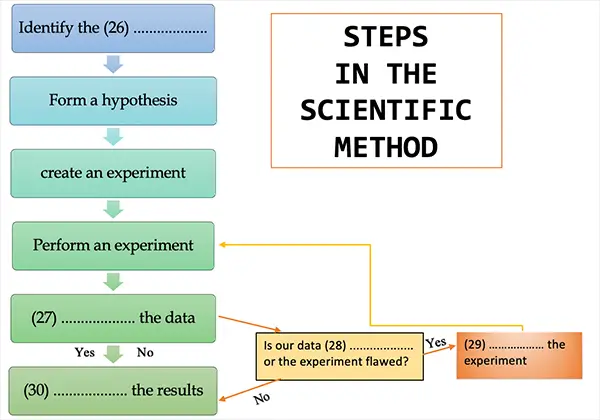
Questions 31-33
Write NO MORE THAN THREE WORDS for each answer.
31) In which part of London is the Tate Modern?
Ans. ………………………………………………………………………
32) What did the Tate Modern building is in use to be?
33) Whose work is displayed on 2 nd level of the Tate Modern?
Questions 34-40
Complete the notes below.
IELTS Academic Listening Test Ans Key
- DISCUSS THEIR DAY
- (SOME)/(THE) CAVES
- RECEPTION STAFF
- 35/THIRTY-FIVE
- 10 AND 3/TEN AND THREE
- GET INVOLVED
- EMOTIONAL OR PHYSICAL
- HOMESICKNESS
- (ABOUT) 45 MINUTES
- (THE) COUNSELLING SERVICE
- PURE RATIONAL THOUGHT
- (THE) 11TH CENTURY
- UNRELIABLE/UNUSUAL/SURPRISING
- COMMUNICATE
- (THE) SOUTH BANK
- (A) POWER STATION
- CONTEMPORARY ARTISTS
- (A) GASWORKS
- THREE-STOREY BUILDING
- MODERN BRITISH ARTISTS
- TEMPORARY EXHIBITIONS
- (A) WAREHOUSE
About IELTS Academic Listening Test
IELTS Academic Listening test no. 23 belongs to the ‘Moderate’ category. So, if you are scoring 32+/40 in this practice test you are highly likely to hit band 7 and above in the real exam setting.
Need more FREE tests? Here’s one more IELTS Listening PDF Practice Test . Check it out.
All the best!!!
- IELTS Listening Practice Test PDF Download – 15
- IELTS Academic Listening Practice Test – 24 (with PDF)
Rajit is the co-founder and an active blogger at 'CIC Talks'. He is best known for his rich expertise in IELTS & Canadian Immigration. Feel free to connect with him on Instagram & Twitter .
You May Also Like
![camping trip listening answers IELTS [Copying photos, Sleep assignment, Dance benefits] Listening Answers, Audio, PDF](https://cictalks.com/wp-content/uploads/2021/08/IELTS-16-LISTENING-TEST-2-390x205.jpeg)
IELTS 16 Listening Test – 02
![camping trip listening answers IELTS 16 [Children's Engg. Workshops, Stoicism] Listening 1 Answers, Audio, PDF](https://cictalks.com/wp-content/uploads/2021/08/IELTS-16-listening-test-1-ans-pdf-audio-390x205.jpg)
Camb. IELTS 16 Listening Test – 01
![camping trip listening answers IELTS Listening free online IDP practice [TEST 50]](https://cictalks.com/wp-content/uploads/2021/05/IELTS-Listening-free-online-IDP-practice-TEST-50-390x205.jpeg)
IELTS Listening Free Online IDP Practice Test – 50
Leave a reply cancel reply.
Your email address will not be published. Required fields are marked *
Save my name, email, and website in this browser for the next time I comment.
Camping Trip PET listening
Loading ad...
estherlee76
Listen & fill in the blanks.
- Google Classroom
- Microsoft Teams
- Download PDF
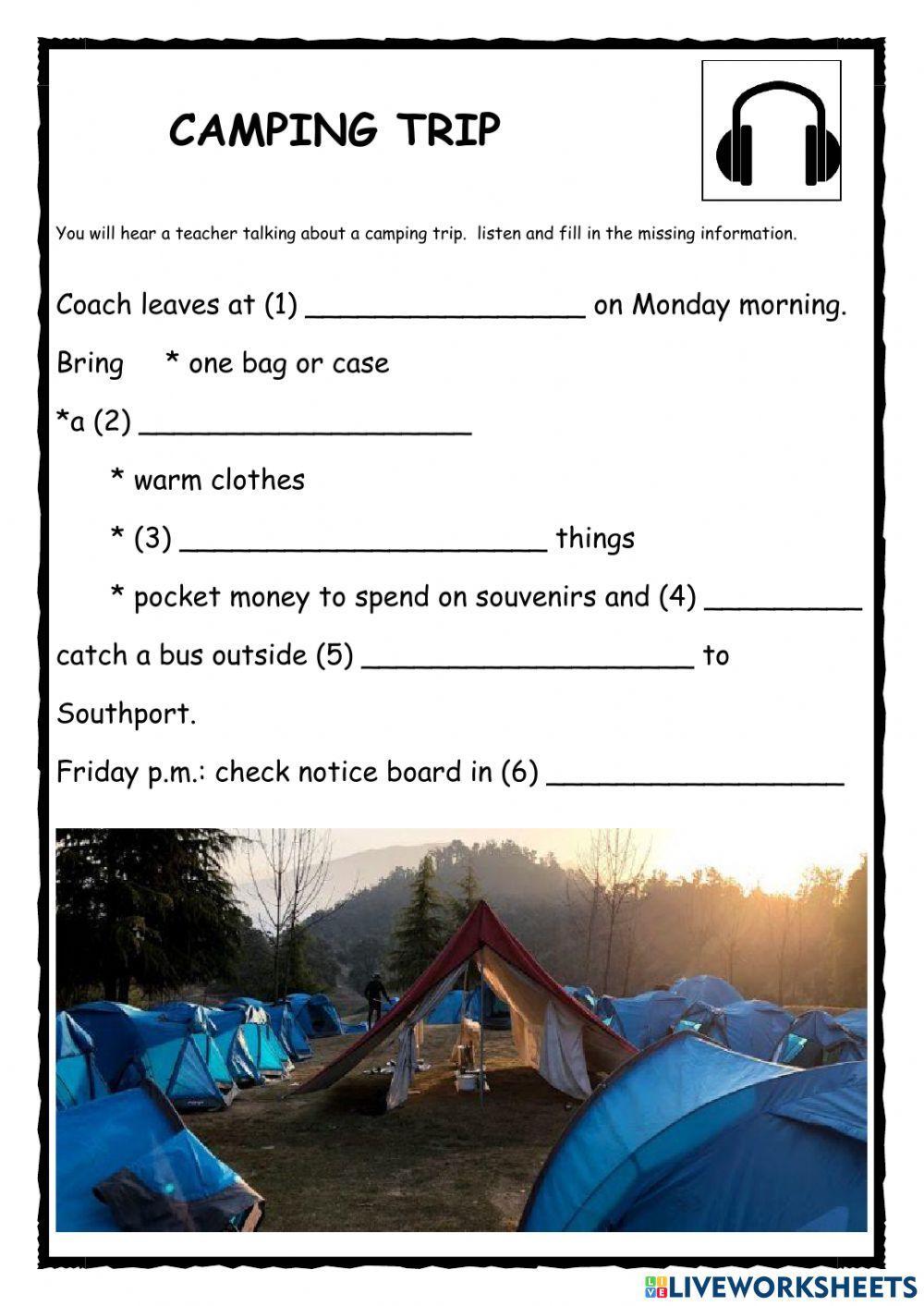

COMMENTS
Camping Trip Listening Exercise. You will hear Matt and Uncle Jack talking about their camping trip, you have to listen and choose the correct answers to the questions. This provides practice for Listening Part 3 of the A2 Key examination. About 5-10 minutes. Listening to a conversation about a camping trip. Developing stages of learning English.
PART 1 - QUESTIONS 1-10. Question 1-5: Choose the correct letter, A, B or C. Example: Mr Thomson has just been A.writing reports on the pupils.; B. reading about the pupils' progress. C. speaking to a class of pupils. 1. The camping trip will be held. A. the following month. B. from the 24* to the 26*. C. over a five-day period. 2. Jamie's complaint about last year's trip was that
One summer, four friends named Josh, Jerry, Lisa, and Kelly decided to go camping in the Utah mountains. They packed their gear, including tents, sleeping bags, and plenty of food, and set off on their adventure. After hiking for a few hours, they came across a beautiful waterfall and decided to set up camp nearby.
Ask students to compare their answers with a partner. Do not check answers yet. 2nd listening. Play the audio for the 2nd listening (8:10-9:49) (from "Now listen again". Stop after "That is the end of Part 2") Send the task to students. Play the audio following one of the options described in the section above.
Questions 1-5. Choose the correct letter A , B or C. (1) The camping trip will be held. A the following month. B from the 24th to the 26th. C over a five-day period. (2) Jamie's complaint about last year's trip that. A the camp wasn't big enough. B he was unhappy while at the camp.
TEST 591 GOOGLE DRIVE LINK for PDFhttps://drive.google.com/file/d/1wpe2VxJUq2XiCIuorZE2kI97vPl8G5XG/view?usp=drivesdk GOOGLE DRIVE LINK for PDF of other List...
How difficult was this activity? Too easy. CEFR Level. A1-A2. Time. 5-10 minutes. Skills. Reading. Read about a camping trip and answer some questions.
* IELTS Listening Test Practice.* Correct answers to band score: 39-40: 9.0 37-38: 8.5 35-36: 8.0 32-34: 7.5 30-31: 7.0 26-29: 6.5 23-25: 6.0 18-22: ...
I answer questions about camping to serve as American English listening practice.I got the questions from this website: https://www.eslconversationquestions....
Easy English listening Lesson 4 - Going Camping. The Bright family went camping on the weekend. The Bright family went to Silent Lake. The Bright family left on Friday. They camped for three days. The Bright family brought a big tent. They brought a lot of food. They brought insect repellant. The Bright family had a campfire on Friday.
The Carter Family Goes On A Camping Trip. Let's do English ESL deep listening: focus on meaning. Listening comprehension check with multiple tasks including an open-ended prediction question.
Part 2 For each question, write the correct answer in the gap. Write one word or a number or a date or a time. You will hear a teacher telling students about a school camping trip. School Camping Trip. Cost of trip: £39.00. Give money to: Mrs 6. Day of return: 7. Time to arrive at school: 8 a.m.
Cambridge IELTS 7 Listening Test 1 - Section 2. Section 2: Questions 11-16. Choose the correct letter A, B or C. 11. PS Camping has been organising holidays for. A 15 years. B 20 years. C 25 years. 12.
A help each other. B work more quickly. C answer his questions about their stories. 18 You will hear a mother talking to her son, George. What's the problem? A Fruit makes George's cousin feel awful. B George hasn't got any carrots. C George's cousin can't eat chocolate. 19 You will hear a teacher talking to students.
In Listening Test 44, you will hear 4 audio recordings and answer questions 1-40. Section 1 is a conversation between a receptionist of camping centre and a customer who wants to make a booking.. Section 2 is a staff member briefing a group of mothers on the attractions at the Children's Grand Forest play centre.. Section 3 is a dialogue between a PE teacher and an administrator at a summer ...
MODIFIED LISTENING TEST WITH ANSWERS #ieltslistening #latestieltslistening #ieltspreparationListening Mcqs https://youtu.be/-3rcSClX7k4 (@AMERICANINSTITUTEOF...
The keywords concerned in Q1 must be "customer", "bring children" and "have". From the question, we can assume that the answer must be a noun, a noun phrase, a verb or a phrase. According to the customer, he wants to bring children who have failed exams to the centre. Therefore, the answer to Q1 must be "failed exams".
2 Answer: 8 o'clock/ 8 am. Listen from here Locate Explain Report. The keywords in Q2 are Departing time, coach, next Monday. From the keywords, we anticipate that the answer should be a time. There are three times mentioned in the conversation. The first one is 7, which is the time they gather outside the library.
B a satisfactory ending. C a lot of excitement. 12 You hear two friends talking about a new cafe that has opened. They agree that the new coffee shop. A has great variety. B costs too much. C has poor service. 13 You hear two friends talking about their plans for the weekend.
In this CAMB IELTS Listening Test 01 (Audio, Answers, PDF, Transcript), you'll find: Questions 1-10. Buckworth Conservation Group Listening Answers, Audio, PDF, and Transcript. Questions 11-20. Boat trip round Tasmania Listening Answers, Audio, PDF, and Transcript. Questions 21-30.
free ielts practiceall credit goes to the original maker of the audio tracki have only edited it, according to the new listening format.#ielts#ieltslistening...
IELTS Academic Listening Test: This is the 23rd test of our LISTENING Practice Test Series. All tests are based on real exam patterns and correspond to the actual difficulty level you may find in the IELTS. This Academic listening test is divided into four sections - 1, 2, 3 and 4. Section 1 is a discussion between a Head Teacher and a ...
Camping Trip PET listening. Loading ad... estherlee76 Member for 5 years Age: 8+ Level: B1. Language: English (en) ID: 1482477. 04/10/2021. Country code: PE. Country: Peru. School subject: English as a Second Language (ESL) (1061958) Main content: Travel and tourism (2012779) Listen & fill in the blanks. Other contents: ...